July 2015
July 2015 JoyMunicipalities getting it right, improving services
Municipalities getting it right, improving services JoyMore and more municipalities are managing their finances better, which is translating into better service delivery for communities.
Auditor-General Kimi Makwetu recently announced a comprehensive report on audits that were done on municipalities and municipal entities for the financial year 2013/14.
The report showed that the number of municipalities that improved their submission of financial statements had increased notably across several provinces.
The Auditor-General said that the total number of municipalities and municipal entities with unqualified audits went up from 30 in the 2012/ 13 financial year to 58 in 2013/14, which is made up of 40 (14 per cent) of the 268 municipalities and 18 (32 per cent) of the 57 municipal entities.
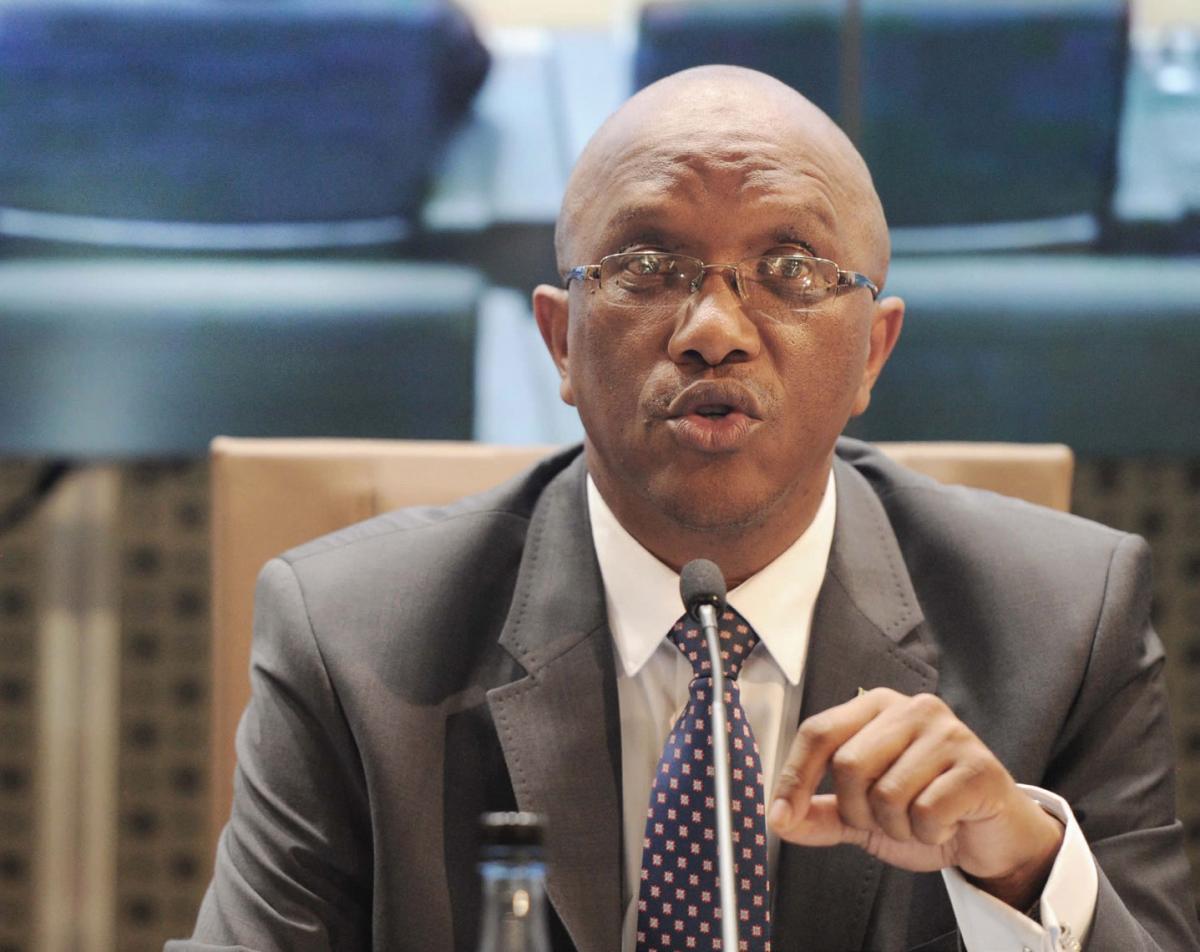 Makwetu said he was impressed with the work of the best performing municipalities as they had improved the lives of people.
Makwetu said he was impressed with the work of the best performing municipalities as they had improved the lives of people.
After completing the audits, he visited several municipalities that did well to congratulate them. While he was there, he visited several municipal projects to see how improved results impacted on service delivery in the KwaZulu-Natal, Western Cape, Mpumalanga, Gauteng and the Eastern Cape Province.
“The political and administrative leadership accompanied me and my team on visits to some key projects, where they provided us with detailed information on how these projects are managed for the benefit of local communities.
“I was impressed by the sterling work that these municipalities, some in the remotest parts of our country, are doing to have a positive impact on their communities,” he said.
Makwetu added that the municipalities that have shown that good governance controls can be effectively used to improve the lives of people and that the political and administrative leadership was starting to set the right tone and leading by example.
Audit results welcomed
Cooperative Governance and Traditional Affairs Minister Pravin Gordhan said the improved municipal audit results showed that government prioritised good governance and service delivery.
“The report points to a steady trend towards good governance and sound financial management.
“This reinforces more efficient and accountable basic service delivery in line with the ‘Back to Basics’ approach,” he said.
The Minister launched the “Back to Basics” strategy in September 2014 as government took the approach of ensuring that municipalities get basic services right, as well as listen to concerns from the public more effectively.
Years of steady improvement
Forty-one per cent of all auditees received unqualified audits audits with findings in the year under review, compared to 40 per cent in 2012/13 financial year.
A unqualified audit with no findings means a municipality’s books were in order and that there were no errors on its financial reporting; they met their service delivery targets based on their promises; and they complied with legislation when handling public funds.
An ‘unqualified audit with findings’ means a municipality was able to present financial statements with no errors, but failed to meet all their targets and did not set clear targets or indicate which legislation they used to manage funds.
The results showed that 22 per cent were ‘qualified with findings’ in the year under review, compared to 28 per cent in 2012/13 financial year.
This means that municipalities were unable to produce reliable financial statements or comply with financial management legislation.
Sixteen per cent of municipalities and municipal entities obtained ‘disclaimers with findings’. This means the municipality’s financial records were so bad that the Auditor-General could not even express an opinion.
How provinces fared |
|||
No municipalities or entities achieved unqualified audits in the Free State, Limpopo and North West. |
Filling up is his passion
Filling up is his passion Albert Pule
Three and half years ago, Stephen Phalatse and his business partner took a risk when they both left their jobs to start their own business called Hamisa Mining and Engineering, a holding company for Tshela Filling Station.
Phalatse, a former Free State Regional Manager of Business Banking at Standard Bank said he does not regret his decision to leave his plush job because he is currently enjoying what he does.
“It fills me with joy to see the happy faces of people who work here, when some of them came here for interviews, you could see the desperation in their eyes and now that they’ve got something and are able to put food on the table, you can see the difference.”
Phalatse’s business was funded by the National Empowerment Fund (NEF) to the tune of R3.1 million to buy a Caltex Franchise that he called Tshela Filling Station.
“The relationship between the NEF and myself has been good and so far the business is doing well,” he said with a smile during a recent interview with Vuk’uzenzele.
The filling station is situated on a busy road in the township of Botshabelo outside Bloemfontein and employs 22 young people from the township.
Phalatse, who holds a Bachelor of Commerce and an Honors Degree in Business Management from the University of Free State, worked at Standard Bank for 13 years before he decided to be a fulltime businessman.
Challenges
Since he opened the filling station, Phalatse said like any other business, he has encountered challenges.
“Two of the major challenges that I have faced when I started was access to the markets and lack of experience in running a business of this nature.
“As an inexperienced businessman, you have to double your efforts to prove yourself especially in the filling station business.”
He said he spent sleepless nights working hard to ensure that his business becomes successful. “I was at a point where I was living on my pension and it was running out, I had only one option and that was to make a success of the business and I’m glad that I’ve made it.”
Phalatse said young entrepreneurs must have passion for what they do and be prepared to work hard to make it because government is trying hard to assist young and up and coming black entrepreneurs.
Honouring Nelson Mandela
Honouring Nelson Mandela JoyIn 2009 the United Nations General Assembly declared Madiba’s birthday on 18 July as Nelson Mandela International Day.
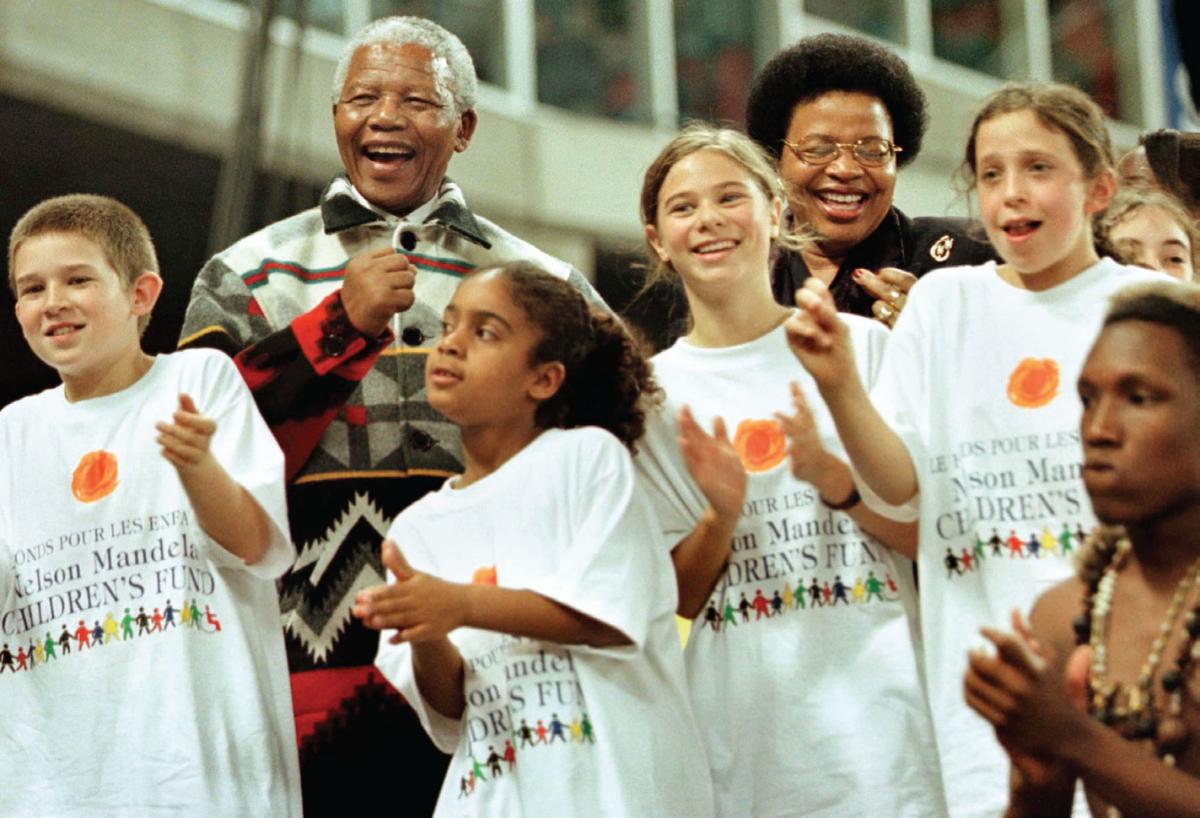 Since then, Mandela Day has become a call to action to change the world for the better through the kind of service and leadership championed by Mr Mandela during his 67 years of service, not just on a single day of the year but through ongoing initiatives.
Since then, Mandela Day has become a call to action to change the world for the better through the kind of service and leadership championed by Mr Mandela during his 67 years of service, not just on a single day of the year but through ongoing initiatives.
What does this mean in practice for you and me? By way of example, this month a group of volunteers from the public sector, private companies and individual change makers (including myself) will be engaged in the Kilimanjaro Executive Challenge, a climb to the top of Africa’s highest mountain, with the plan to summit on July 18.
We are also tackling this climb as a community project on behalf of the Archbishop Tutu Fellowship Programme run by the African Leadership Institute.
Preparing for this challenge has given me ample time to think about the true meaning of public service.
It’s been tough to find the time to train for my personal Kilimanjaro challenge in the midst of all the daily demands of work.
When I first made my commitment to climb Kilimanjaro, I thought my main challenge would be to get fit enough to make it to the top, especially as we had invited so many prominent South Africans to join us, putting added pressure on us all to finish the trek.
But, really, when we consider the real challenges facing our country, then Kilimanjaro is a molehill rather than a mountain. It is a thought that has kept me going through the slog, and at the end of the day, whether I make it to the top or not is less important than the real task ahead.
The Nelson Mandela Foundation has identified four pillars for Nelson Mandela International Day.
- Education and literacy – because we need to give the youth “a fighting chance”.
- Food security – because many children go to school simply for the meal they receive there and many families continue to go to bed without food.
- Shelter – an essential intervention in our society.
- Volunteerism – because sometimes it is more about giving time, than money.
We believe that all people should have access to sufficient, safe and nutritious food and that activities such as the provision of food parcels, food gardens or feeding schemes can help eliminate world hunger.
We also know that education and literacy, which were so close to Madiba’s heart, are also key to transforming our world.
We know that there is no greater indignity than inadequate shelter, and so if we are able to encourage people to come together to build homes, communities and futures, we are working towards tangible change.
Madiba’s example as a servant is one that everyone can aspire to by committing to daily actions. Not every action for Nelson Mandela Day need be something grand or heroic. We encourage everyone to get involved through whatever action lies closest to their heart.
If you visit the Mandela Day website at http://www.mandeladay.com you will see ideas that have been flowing in. Here you will find an array of activities that people have committed to in order to drive positive change in their communities, from painting murals to brightening up the walls of NGOs to food gardens. Mandela Day should not only be about charity, but also about sustainable development.
“When a man has done what he considers to be his duty to his people and his country, he can rest in peace. I believe I have made that eff ort and that is, therefore, why I will sleep for the eternity.” – Nelson Mandela.
In my case, the aim of the Kilimanjaro Executive Challenge, led by South African adventurer Sibusiso Vilane, is to raise enough money to keep 270 000 girls from rural and impoverished backgrounds in school. How? The money will go towards buying sanitary towels, a seemingly simple act with potentially transformative power, because it makes it possible for girls to attend school throughout the school year.
Thus, the Kilimanjaro climb celebrates Madiba’s legacy through the support of the education of South African girl children, and whether we make it to the top or not, we will only be judged through this one lens.
In his lifetime, Mr Mandela lived by three principles: Free yourself, free others and serve every day. When he was released from prison on 11 February 1990 (now 25 years ago) he said he was placing the “remaining years of my life in your hands”.
In the face of such a towering example of service, who are we to stand back and watch life pass us by without taking action? We challenge you all to find your Kilimanjaro, big or small, and to commit to climbing it.
*Sello Hatang is the CEO of the Nelson Mandela Foundation.
IDC to drive economic development
IDC to drive economic development JoyEconomic Development Minister Ebrahim Patel has called on aspiring entrepreneurs to take advantage of the R23 billion that has been set aside over the next five years to fund “new players”.
 Minister Patel said the funding, made available by the Industrial Development Corporation (IDC) aims to transform the economy and create jobs as government makes a big push to industrialise the economy.
Minister Patel said the funding, made available by the Industrial Development Corporation (IDC) aims to transform the economy and create jobs as government makes a big push to industrialise the economy.
The Minister said this when he recently tabled his department’s Budget Vote speech in the National Assembly. He said the fund would contribute towards industrialisation and that it would go a long way in eradicating inequality and poverty.
The Minister urged aspiring black industrialists to come up with proposals in the productive sectors of the economy where they can set up industries.
“The IDC is committing R100 billion over five years to industrial development. “What is new, and what is significant, is that we are setting aside R23 billion to promote black industrialists.
“This is a five-year programme that is intended to support those companies where black South Africans are both owning and controlling the enterprises in the productive sectors of the economy and is intended to bring more South Africans into the economic mainstream,” he said.
The Minister said the decision to set aside the funding was meant to promote transformation and boost economic growth by unlocking the potential and talent pool of the economy. He said South Africa needed to achieve sustainable and inclusive growth, and that the funding would be made available on concessional terms.
“Aside from black industrialists, there is of course a compelling need to bring more black South Africans into the economy.
“There are also targeted groups – young people, women – they have not been sufficiently brought into the productive activities. So the IDC will make available R9 billion in total – R4,5 billion for women, R4,5 billion for youth,” she said.
The Minister said the funding would be in the form of loans or equities.
Good news for small township enterprises, spaza shops
The Minister said during the current financial year, the Competition Commission would conduct an inquiry to see how smaller businesses in the formal and informal economy can be supported. He said the inquiry would also seek ways in which smaller players could be incorporated into this lucrative sector.
“The Competition Commission will be launching a market inquiry into the retail sector, looking at how we can bring more black South Africans, more small businesses, into the retail sector. “It will examine amongst others, the tenancy arrangements in shopping malls, the growth of township enterprises, small shops, spaza shops and so on, and it is intended to ensure that we have got a competitive but also inclusive retail sector,” he said.
He said another inquiry into the health care industry, which he announced last year, would hold public hearings during the current financial year.
The inquiry was established with the aim of addressing several concerns about the industry, including the cost of health care in South Africa.
How African firms are creating jobs
On the back of attacks on foreign nationals, on 25 May – a date the African Union (AU) Commission has declared as Africa Day – the Department of Economic Development convened a symposium of investors, workers, intellectuals and public officials with the University of the Witwatersrand and the Industrial Development Corporation. The symposium looked at the economic impact of South Africa’s relationship with the rest of the continent. The minister went on a road show to different parts of the country to spread the message that South Africa’s prosperity is intimately tied to economic relations with the rest of the continent. Last year, South Africa exported R300 billion worth of goods to the rest of Africa which was an increase of R36 billion.
“Our total manufacturing, mining and agricultural exports to the rest of Africa sustained 244 000 direct jobs in South Africa, of these, 169 000 are manufacturing. “Africa is now more important for growth in manufacturing exports than Europe, the United States or China,” he said.
Hundreds of jobs created |
|||
|
Jozi to give youth springboard
Jozi to give youth springboard Albert PuleIf you are a young person residing in the vicinity of the City of Johannesburg, you stand a chance to benefit from the city’s flagship programme called Vulindlel‘eJozi.
Vulindlel‘ eJozi is a City of Johannesburg’s initiative responding to the high level of youth unemployment in the city and is expected to prepare young people to enter work, education and training opportunities.
According to the Mayor of Johannesburg Parks Tau, candidates will go through a selection process to be assessed if they qualify. “This programme will begin with screening, assessment and advisory services for all the candidates.
“This will extend into foundation literacy, numeracy and digital literacy for all who participate to raise their earning potential,” he said during his recent State of the City Address.
Vulindlela eJozi is expected to break down barriers to opportunities for 200 000 youth by 2016. “The programme will then identify and create opportunities for young people based on their aptitudes and capabilities.
“These will include formal employment in companies of all sizes, public works programmes, national youth service programmes and micro-enterprise development channels such as Jozi@work.”
The programme will also facilitate the placement of appropriate candidates in training and education programmes.
The city has also started a partnership with the University of Johannesburg where young people from the city will be deployed in different places as digital ambassadors.
“Under a new partnership with the University of Johannesburg, groups of young people will also have access to our Digital Ambassadors programme.
“Over the coming months, as we accelerate the rollout of our free public Wi-Fi hotspots announced last year, we will also deploy 3 000 young people, grouped as micro-companies, to provide digital literacy training. This is the bridge we are building across the digital divide,” he said.
Mayor Tau added that Braamfontein has been earmarked for roll-out of high speed broadband access. “We are in the process of blanketing Braamfontein with Wi-Fi that provides high speed broadband access, parts of which are live right now.
“This goes beyond hotspot access at specific buildings and demonstrates how public Wi-Fi can work across a wide area. In this mecca of youthful activity, the Wi-Fi mesh will become a showcase for how subsidised access to Internet means access to opportunity and education.”
Young people must grab opportunities
Young people must grab opportunities Joy
In South Africa, the month of June – when we observe Youth Month – is often a time when commentators and analysts emerge from all sorts of places to suggest that South Africa’s young people face a bleak future; that unemployment, HIV and crime dominate young people’s lives and that government or our society has little to offer to overcome these challenges.
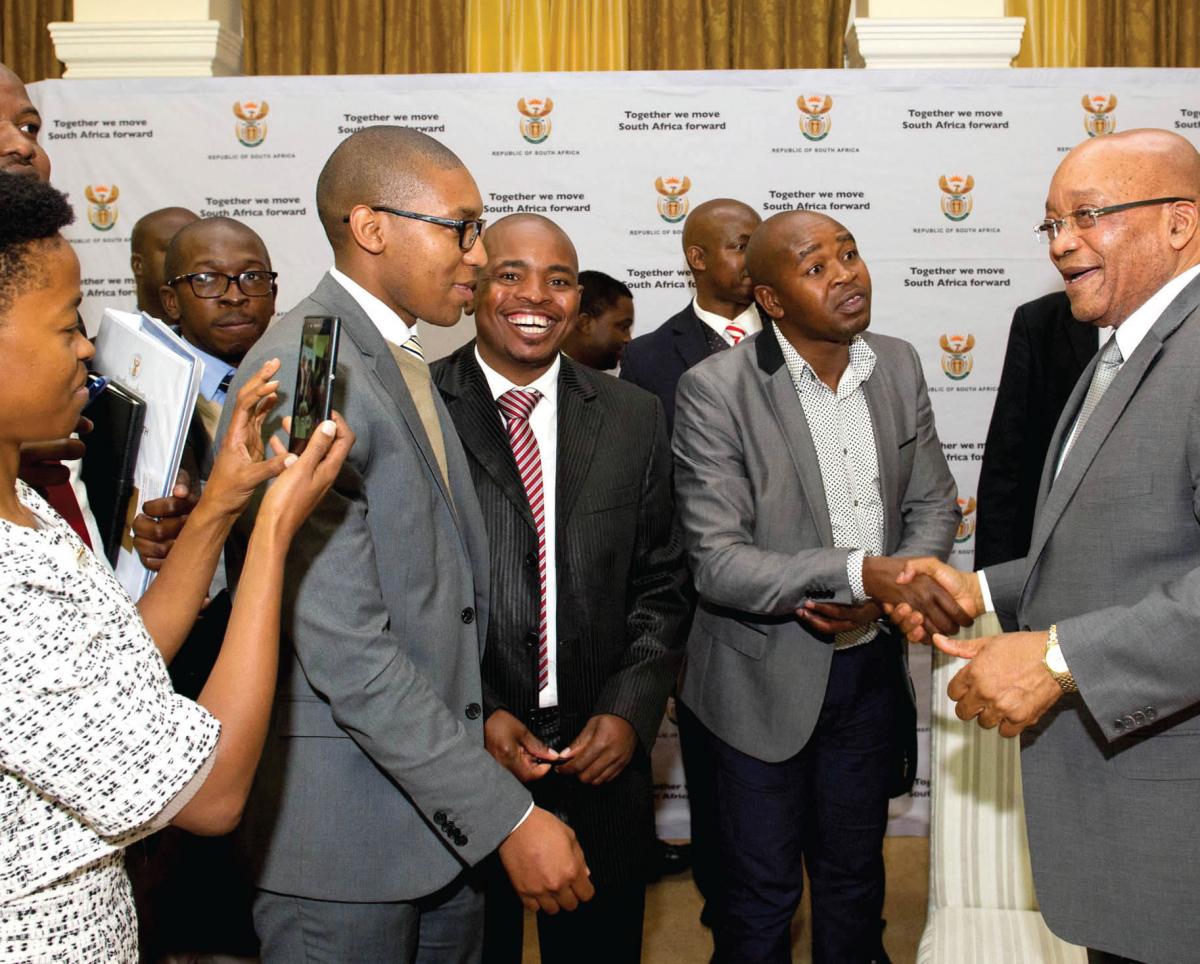 These generalisations serve to take people’s eyes off the reality of South Africa’s investment in all its young people on whose ambitions and fortunes our future rests.
These generalisations serve to take people’s eyes off the reality of South Africa’s investment in all its young people on whose ambitions and fortunes our future rests.
This reality does not ignore our problems; it responds to our problems, and it is a reality that anyone can see unfolding before their very eyes: in our classrooms and lecture halls; on our sports fields; in offices and industrial parks; in our science laboratories and even in the cars on our busy freeways. These are all places where you will see young people benefiting from improved education opportunities and the material benefits that come with them.
Tens of thousands of students on our university and college campuses are young people who come from poor families who never produced graduates during decades of being denied access to education under apartheid.
Hundreds of thousands of young people are driving brand-new vehicles or living in properties they own – in many cases, also for the first time within their families, because they have good jobs and secure income that enables a good standard of living. Many can now support their parents and put food on the table at home.
Thousands of young people are playing sports in places – in South Africa and elsewhere – that their parents could only dream of before 1994.
This undeniable progress is the result of a growing economy – no matter how slowly – in which more South Africans are being educated and prepared for jobs that allow them to pay taxes that are invested in the country’s development.
This development entails infrastructure expansion, the provision of basic services, the provision of social grants to the most vulnerable, government support for small businesses and the ability of South Africans to interact and transact with just about every country in the world.
South Africa now enjoys relations with countries where we could not set foot during the apartheid era.
This reality is no accident; it is rooted on our ongoing work as government, working with all sectors of our society, to achieve our National Development Plan’s Vision 2030.
The National Development Plan tells us: “The determinant of success is whether a country can harness the advantage of having a large number of young people who are able and willing to work. To do so means providing them with education and skills, and helping school leavers find work that is stimulating and through which they can fulfil their aspirations.”
The Plan reminds us that South Africa has an urbanising, youthful population, which presents an opportunity to boost economic growth, increase employment and reduce poverty.
With this in mind, the National Planning Commission, which drew up the National Development Plan, suggested actions including the following:
- A nutrition intervention for pregnant women and young children.
- Universal access to two years of early childhood development.
- Improving the school system, including increasing the number of students achieving above 50 per cent in literacy and mathematics, increasing learner retention rates to 90 per cent and bolstering teacher training.
- Strengthening youth service programmes and introduce new, community-based programmes to offer young people life-skills training, entrepreneurship training and opportunities to participate in community development programmes.
- Provide full funding assistance covering tuition, books, accommodation and living allowance to students from poor families.
- A tax incentive to employers to reduce the initial cost of hiring young labour-market entrants.
This was a wish list when the National Development Plan was first developed, but is now a reality. This is what we are doing for young people to ensure that we break the patterns of poverty and underdevelopment with which previous generations were burdened.
When we recently presented the Presidency Budget Vote in Parliament, Deputy Minister Buti Manamela pointed out that our goal as a country and as stated in the National Youth Policy 2020 is to enhance the participation of young people in the economy, through targeted programmes initiated by government, business and civil society.
Last year, the Industrial Development Corporation (IDC) committed R144 million to enterprises that are youth empowered and producing textiles, steel window frames, food, footwear, and also in tourism and film production resulting in thousands of jobs.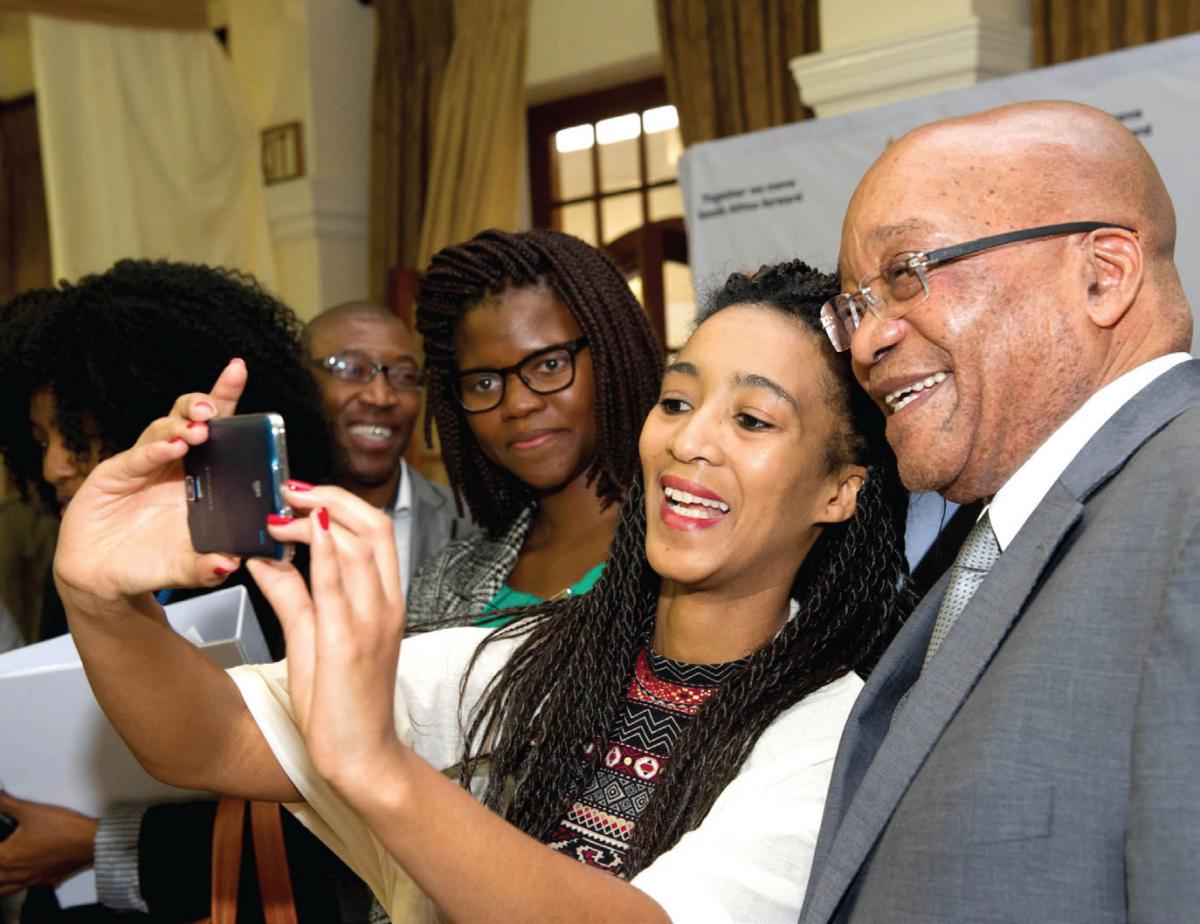
SEFA also disbursed R310 million to around 16 400 small and micro entrepreneurs. This, and many others, honorable members, is hope in action and not just cheap talk. As part of the skills programme last year, more than 6,000 youth have been trained by the National and Provincial Departments of Public Works through the EPWP programme using the National Youth Service model, with a targeted 8 000 for the current financial year. Indeed, this is hope in action.
The National Youth Service Framework is being finalised for public comment, and through this, we intend to simplify the NYS, improve its coordination and increase the participant’s intake to give hope in action for the 3.5 million young people Not in Education, Employment or Training.
The National Youth Employment Accord was signed in April 2013. Since then, employment for youth aged 15 to 34 has increased by some 245 000, or 4 per cent. That means it has grown twice as fast as the number of people not in this age group. At the same time, the number of youth unemployed has fallen by 70 000.
From April 2013 when the Youth Accord was signed to December 2014 when the last figures were verified, 955 833 youth employment opportunities were created.
Employment has been advanced through state procurement, with Gauteng Province’s public procurement spend for youth since the signing of the accord at R1.8 billion in the last two financial years.
Furthermore, 28 000 young people were registered as artisans through the SETAs in the 2014/5 financial year, and over 14 300 completed their training. Moreover, the share of young people benefiting from our public employment schemes has increased to over half.
We have established a Presidential Youth Working Group Task Team made up of Deputy Ministers who are responsible for coordinating and championing interventions to promote youth development and empowerment across government, and bringing the private sector, civil society, trade unions and other role players into the fold.
The outlook for young people is, therefore, much brighter than the headlines suggest – and I therefore urge young people to focus on opportunities; to make the effort to apply and enroll for opportunities that exist; to think about how you can help build a better South Africa, for yourself and your family, but also for the community around you.
Also think about how you can impact on the rest of our Continent and the world. South Africa is a limitless country, and so is your potential as a human being and member of our society.
Go out and write your headlines!
Basic Education Minister outlines spending priorities
Basic Education Minister outlines spending priorities JoyBasic Education Minister Angie Motshekga says the National School Nutrition Programme (NSNP) – coupled with scholar transport – will remain a government priority as it has improved the lives of learners from poor households.
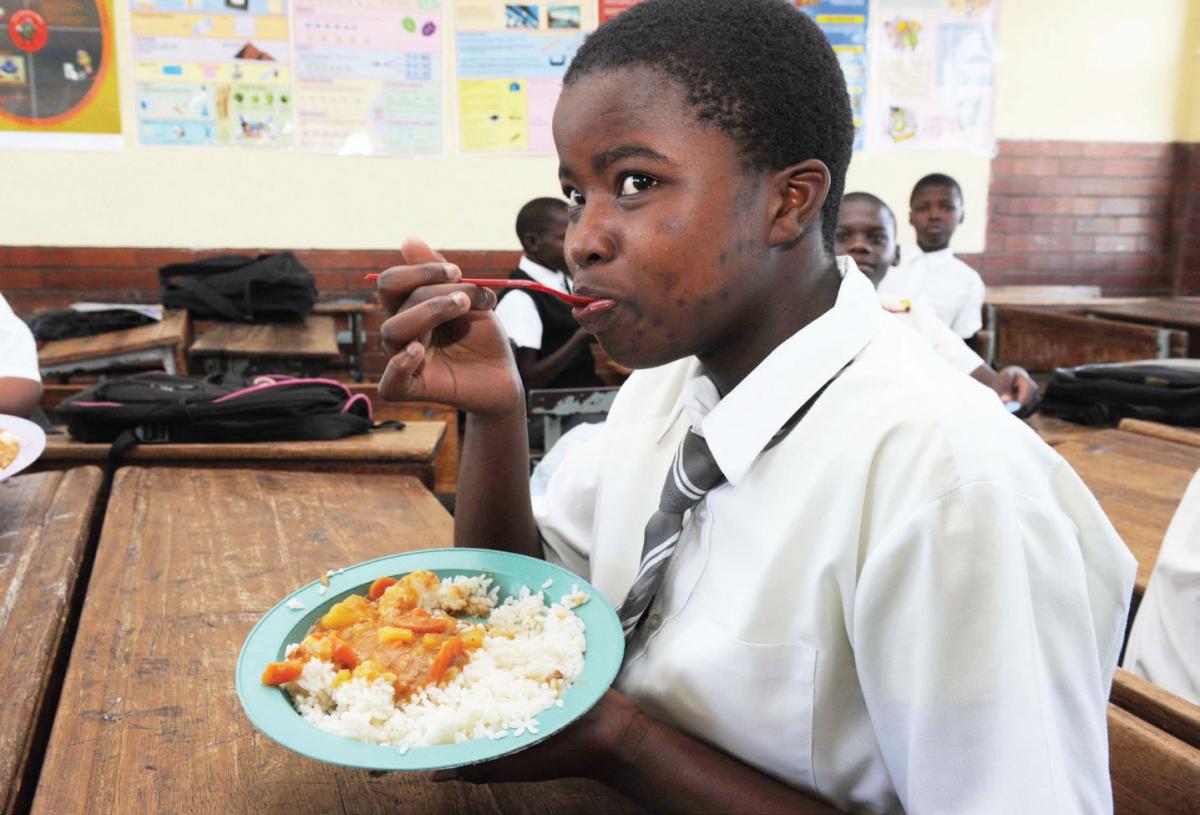 The Minister said this when she recently tabled the department’s Budget Vote speech in Parliament in Cape Town.
The Minister said this when she recently tabled the department’s Budget Vote speech in Parliament in Cape Town.
She said the policy contributes to quality education and improved health among learners.
“This pro-poor programme, coupled with learner transport – which is provided to learners who have to travel 5 km and more from their homes to the nearest schools - [has] been key in ensuring access and the retention of our learners in our basic education system,” she said.
Concerns have been raised over the safety of learners who walk long distances from school, especially those who stay behind after school hours to study or participate in extra-mural activities.
The Minister said scholar transport must be reliable and ensure the safety of learners while in transit. “My Department, in collaboration with the Department of Transport, has gazetted for public comment the learner transport policy. “The intention is to have such a policy finalised for implementation in the current financial year,” she said.
Meanwhile, the Minister said research has found that bullying, violence, drugs and other social challenges remain problems in South Africa’s communities.
She said the Basic Education department has, in partnership with the Department of Health, developed a minimum well-being package for all learners which includes strengthened implementation of the Integrated School Health Programme.
“We have specially focused programmes on sexual and reproductive health with priority areas including HIV, AIDS, sexually transmitted infections (STIs) and TB.
“The learner well-being programme for our learners must continue to provide recreational activities, including school sport, arts and culture programmes to ensure that our learners continue to receive a well-rounded basic education,” she said.
New exit level certificate to address unemployment
Minister Motshekga said her department plans to introduce a new school exit level certificate to address skills shortages and unemployment.
“One of the big announcements I will be making this year is the introduction of a new school exit level certificate.
“To address skills shortages and unemployment in the country, the [department] is introducing a second skills and vocational pathway by developing an exit level qualification at NQF (National Qualification Framework) level 1 that will specifically benefit learners who struggle to attain the academic requirements of the National Senior Certificate (NSC),” she said.
The Minister said the programme, which comprises 26 skills and vocational subjects, promises to bring South Africa in line with many growing economies.
Bid to make history compulsory
The Minister said in light of recent events that have rocked the nation, including the recent attacks on foreign nationals and the defacing of statues, the teaching of South African history is in the spotlight.
Young people have joined in on these events, raising concerns that they may not be well-informed about the history of the country.
Minister Motshekga said it has become crucial for South Africans, especially young people, to know where they come from in order to move South Africa forward.
“Media reports indicated that many of those who participated in the looting, violence and vandalism were youths. We need to equip our youth with an accurate account of our history in order for them to make educated decisions regarding their own future.
“As per the NSC Ministerial Task Team recommendations, further research will be conducted on the best approach of making History a compulsory subject for all learners in grade 10 to 12. In pursuit of this, a ministerial task team will be established to investigate the content and modality of how best to implement this, and a roundtable discussion with stakeholders will also be held,” she said.
ANA extended to Grade 7 and 8 learners
The Minister said, meanwhile, that she would brief Parliament on the progress made in improving the rollout of the Annual National Assessment (ANA).
She said the ANA has proved to be a useful tool for diagnosing learning challenges when it comes to literacy.
“The focus until 2019 is on using ANAs to drive classroom performance and learner attainment at all levels, not just in Grades 3, 6 and 9. A major shift in this budget period shall be the inclusion of grades 7 and 8 in ANA.
“The total number of learners who will participate in ANA increases from the current 7 million to approximately 9 million,” she said.
Achievements to date
- Over 107 newly built or refurbished schools countrywide as part of the Accelerated Schools Infrastructure Delivery Initiative (ASIDI) were delivered.
- The national pass rate for the National Senior Certificate (Grade 12) has gone up from 75, 8 per cent to 77, 1 per cent after the supplementary 2014 exams.
- The Kha Ri Gude Mass Literacy Campaign will get a reduced allocation of R439 584 million in 2015/16. This campaign has affected the lives of over 3, 5 million of our people.
- As part of the Extended Public Works Programme (EPWP) Kha Ri Gude has been allocated R65.099 million. This will contribute significantly towards job-creation as it will make it possible to recruit and train Kha Ri Gude volunteers.
Private partnership to improve pass rate in KZN
Private partnership to improve pass rate in KZN JoyThousands of Accounting learners in KwaZulu-Natal (KZN) stand to benefit from a three-year partnership between the provincial Department of Education and the private company, Risk and Reward.
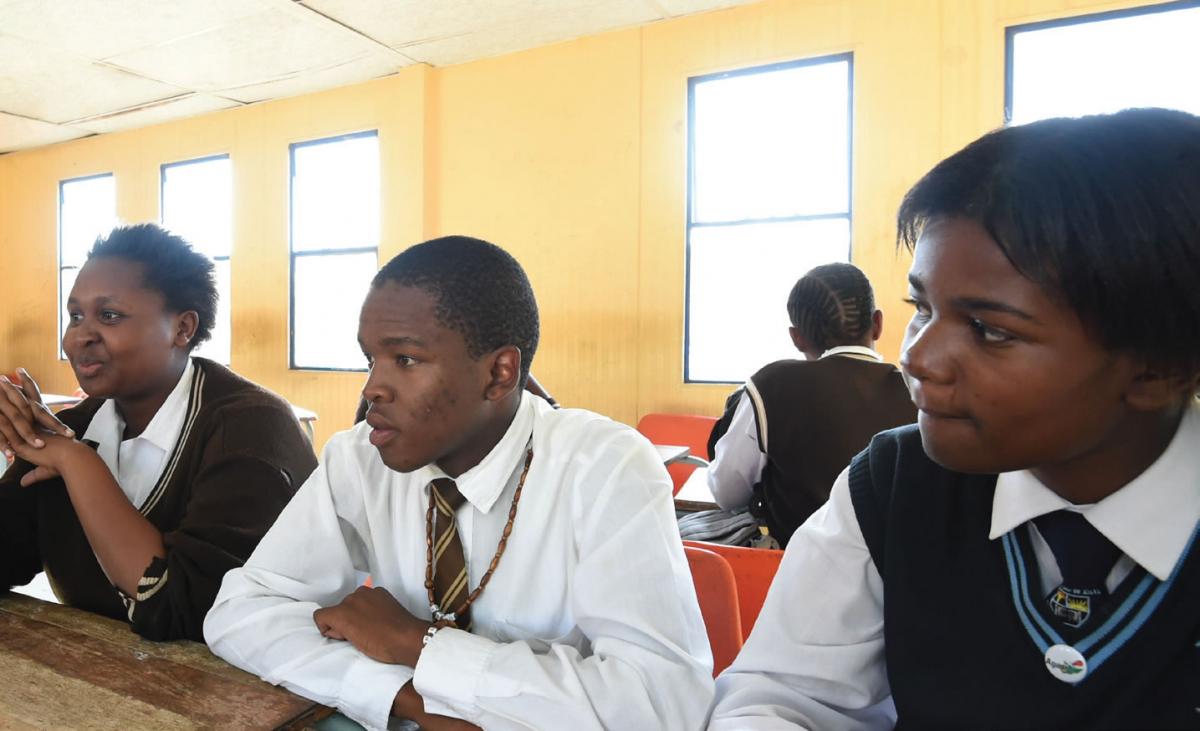 Risk and Reward aims to help the department by teaching accounting around the province, at no cost, to improve KZN’s 2015 matric pass rate. Risk and Reward will teach educators and learners in seven districts, identified by the department, that need the most help with Accounting as a subject.
Risk and Reward aims to help the department by teaching accounting around the province, at no cost, to improve KZN’s 2015 matric pass rate. Risk and Reward will teach educators and learners in seven districts, identified by the department, that need the most help with Accounting as a subject.
The districts that will be helped are those of Umkhanyakude, Zululand, Uthungulu, Amajuba, Umzinyathi, Sisonke and iLembe. Learners will attend classes on Saturdays and educators will go through continuous enrichment programmes in 2015.
Risk and Reward will develop innovative programmes to enhance the learning of Accounting and will also use its 12-Round Accounting board game as part of its innovative way of teaching.
The company will also introduce learner competitions such as the Future Accountants Initiative Competition to help learners understand the subject.
In this competition, learners will pretend to be business owners and will be expected to compile reports and balance sheets on the performance of their buisness.
All seven districts will compete in the competition and Risk and Reward will partner with other accounting firms such as Ngubane and Company, Sizwe Ntsaluba Gobodo and Ubuchule Company and Ukukhanya Company.
This is not the first time that the company has teamed up with public schools. In 2013, it was part of a mentorship programme with Adams College High School in Durban. With the company’s help the school’s results improved from four distinctions to 44.
Risk and Reward product developer Thabani Zulu said he was challenging the corporate community to give of their time to help improve the standard of education for children in the country.
The company offers business advisory services to support any business via business consulting, financial management, human resources, administration, information technology (IT) solutions, marketing and branding.
KZN Education MEC Neliswa Nkonyeni said she hoped that this programme would encourage more private sector players to follow in the footsteps of Risk and Reward.
She also said many academics and education specialists had offered their services to help improve the overall education system in the province, at no cost to the department.
“Others who are offering their services are the Mazibuye and the Swarati Institute, which are running a Maths and Science intervention programme.
“We also now have a Mathematics and Science Ambassador who is going to source private funding to inject into our programmes to lift the standard of teaching and learning in these fields.
“Another partnership is with the Moses Kotane Institute, which provides support to teachers in Maths, Science, Technology and Engineering,” said MEC Nkonyeni.
She added that these were just some of the many outstanding South Africans who have the interests of the child at heart, for which she is very grateful.
State-owned companies chip away at skills shortages
State-owned companies chip away at skills shortages JoyDeputy Minister of Public Enterprises Bulelani Magwanishe says State-Owned Companies (SOCs) have contributed to government’s agenda of tackling skills shortages by providing training to thousands of new trainees.
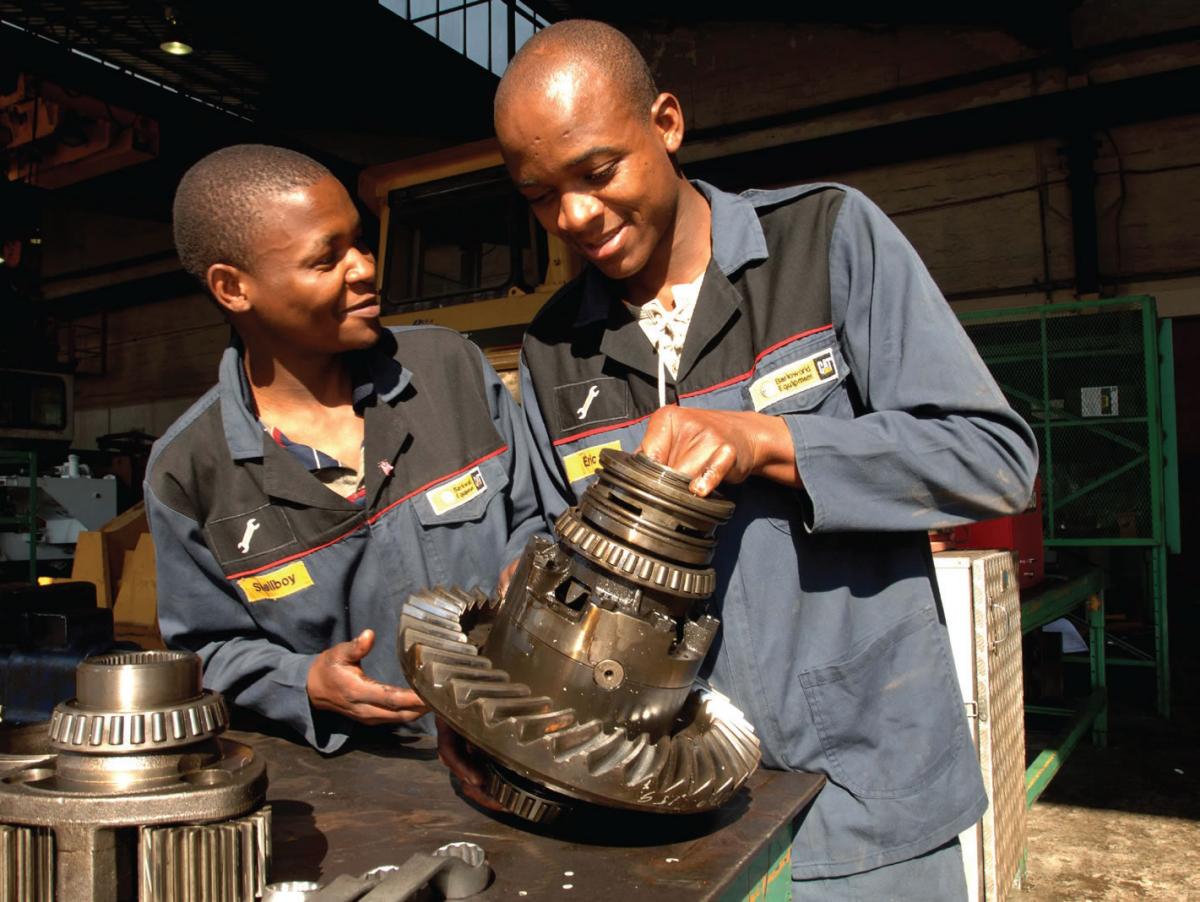 The Deputy Minister said this when he tabled the department’s Budget Vote in Parliament recently. He said the target was mostly young people, especially those from previously disadvantaged backgrounds. Previously Africans in particular were barred from receiving this type of training.
The Deputy Minister said this when he tabled the department’s Budget Vote in Parliament recently. He said the target was mostly young people, especially those from previously disadvantaged backgrounds. Previously Africans in particular were barred from receiving this type of training.
One needs to go to Transnet, Denel, Eskom, SAX, SAFCOL and Alexkor to see what South Africans do with Maths and Science, he pointed out.
“The MOU signed with the Department of Higher Education has seen Denel receiving R58 million to train 197 artisan trainees.
“Eskom received R174 million to train 1 250 artisans. We are responding to the National Development Plan’s call to increase the artisan pool,” he said.
Deputy Minister Magwanishe said in the 2014/15 financial year, the companies collectively enrolled 5 286 new trainees in various scarce and critical skills.
This represented 790 artisans, 616 technician, 387 engineers and 11 cadet pilots.
He said that 3 320 trainees were enrolled in various sector-specific critical skills programmes. Eskom collaborated with its supplier network to train 1 916 matriculants in artisan trade, he said.
“The 541 graduates were placed in experiential programmes. The 2015/16 financial year will see a collective enrolment of 5 776 trainees in various skills.
“Our SOCs continue to ensure that the winter of despair is changed into a summer of hope by driving entrepreneurship,” he said.
Denel’s local spend in the 2014/5 financial year was R3,1 billion. From this budget:
- black owned companies received R683,5 million
- black women owned companies R251,2 million
- black youth companies took R29,2 million.
About 114 companies received R17,3 million in support through the Enterprise and Supplier Development interventions, the Deputy Minister said.
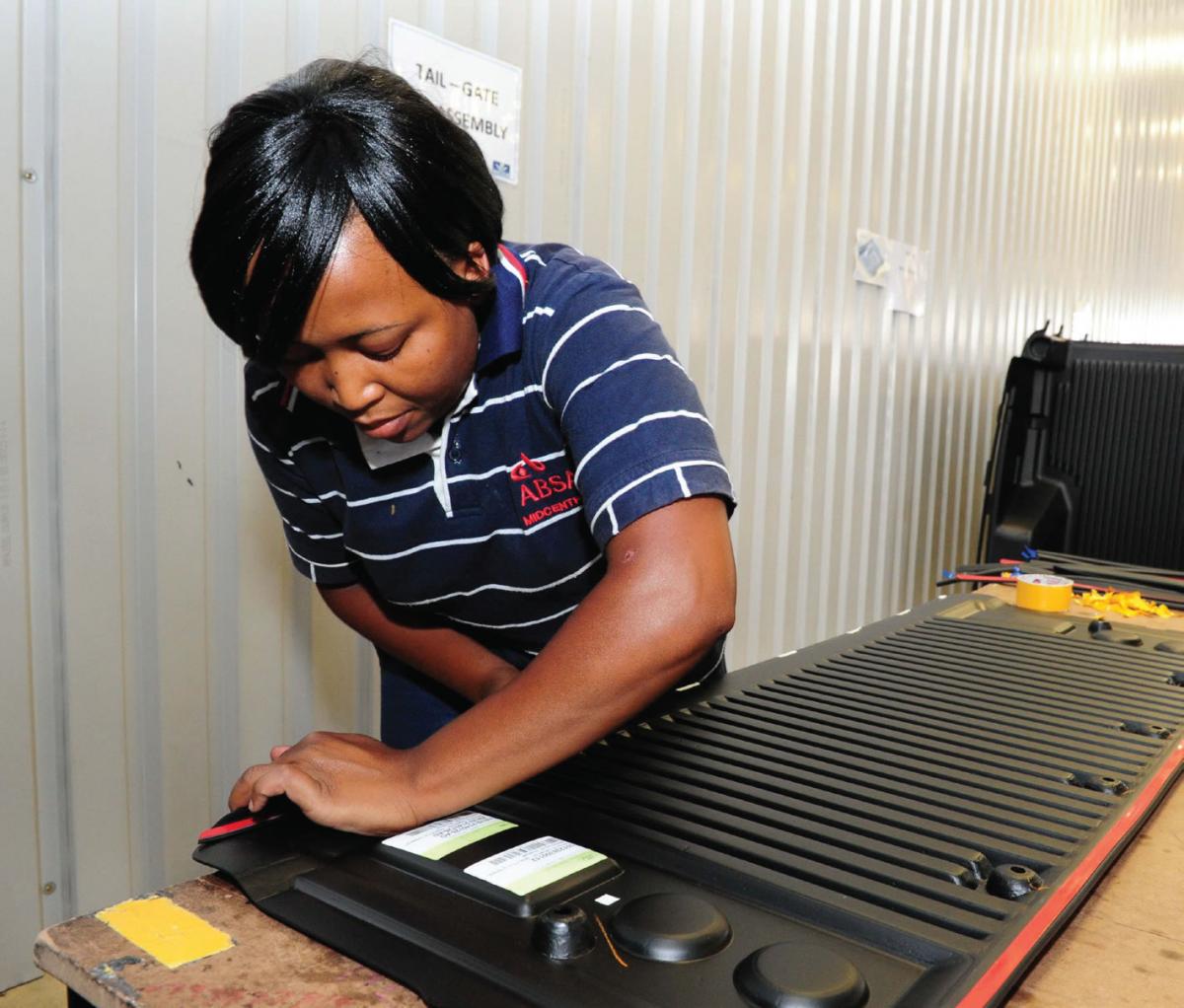 He added that Transnet spent over R43 billion on local content over the past financial year. The Deputy Minister said:
He added that Transnet spent over R43 billion on local content over the past financial year. The Deputy Minister said:
- R9 billion was spent on black owned companies
- R4 billion on black women owned companies
- R748 million was directed to black youth owned and companies with persons with disabilities.
He said Eskom spent R102 billion in line with the B-BBEE requirements.
“We have placed a lot of emphasis on the CSI collaborations. Moving beyond our relationship with Tata-Africa, we are in discussions with MTN and Nedbank to foster collaboration of our CSI spend.
“We believe that public-private partnership will contribute in achieving government’s developmental objectives.
“In education, we have connected more schools to the telematics system. The Transnet school of Excellence registered a 93 per cent pass rate in grade 12 with 35 per cent obtaining exemptions,” he said.
Rural development a priority
The Deputy Minister said rural development remained a priority for government, and SOCs had a mandate to contribute to this agenda by developing communities in areas where they carry out their projects. He cited the Eskom Infrastructure Development Programme-funded infrastructure improvement of schools in rural areas of North West, KwaZulu-Natal (KZN) and Limpopo as examples of this.
Amongst these:
- Denel and Safcol have spent about R3,2 million supporting rural schools in Limpopo, Mpumalanga and KZN
- Eskom mobile health clinics have reached 2 900 people in 37 schools in rural areas and by June 2015, the number is expected to increase to 5 000. Transnet is committed to a comprehensive primary health care service
- the two Phelophepa trains helped 133 000 patients and provided experiential training to 1 335 students.
“The SOCs continue to support disadvantaged communities through their Teenage Health Programme. Dignity packs are distributed to learners including children with disabilities in poor communities.
What you need to know about chronic gastritis
What you need to know about chronic gastritis Estelle GreeffGastritis describes a group of conditions that have one thing in common: inflammation of the lining of the stomach. Gastritis occurs when the digestive juices in your stomach inflame and irritate your stomach lining. Acute gastritis is sudden, severe inflammation, while chronic gastritis is long-term inflammation that can last for years if left untreated.
The condition is often associated with ulcers and may increase your risk of stomach cancer.
Symptoms of this condition include stomach pain, indigestion, nausea, heartburn, loss of appetite and feeling too full (or bloated) after eating.
You should consult your doctor immediately if you have black stools, vomit blood or your stomach pain does not go away, as this could be a sign of internal bleeding in your stomach.
Causes of gastritis
Gastritis could be caused by:
- Bacterial infection.
- Drinking too much alcohol.
- Use of street drugs, such as cocaine.
- Taking certain medicines, such as aspirin or ibuprofen, regularly – rather take paracetamol if you need to take something for pain and/or stress.
- Severe stress.
If you suffer from this condition, you should change your eating habits and avoid certain foods, such as citrus fruits and juices (citrus fruits are oranges, lemons and grapefruits), fried food, coffee, alcohol, spicy food and fizzy drinks.
Your diet should consist of low fat dairy products, lean meat (no fat), wholegrain foods, fruits and vegetables (not citrus fruits).
Changing your diet to include these foods may help, however, you should remember that different foods cause problems for different people. The only way to find out which foods irritate your stomach is by taking them out of your diet one by one.
Consult your doctor
If changing your diet does not help then it is best to make an appointment with your doctor. When you make the appointment ask if there is anything you need or must not do before seeing the doctor.
Write down all of your symptoms and the dates and times they occur. Also make a list of any medicines and supplements you are taking.
Elliotdale School gets tech savvy
Elliotdale School gets tech savvy JoyTeaching and learning can be all the more fun and exciting with the right technology and information at your fingertips.
And thanks to partnerships between government and the private sector, pupils at the Ngangolwandle High School in the Eastern Cape are finding this out first hand.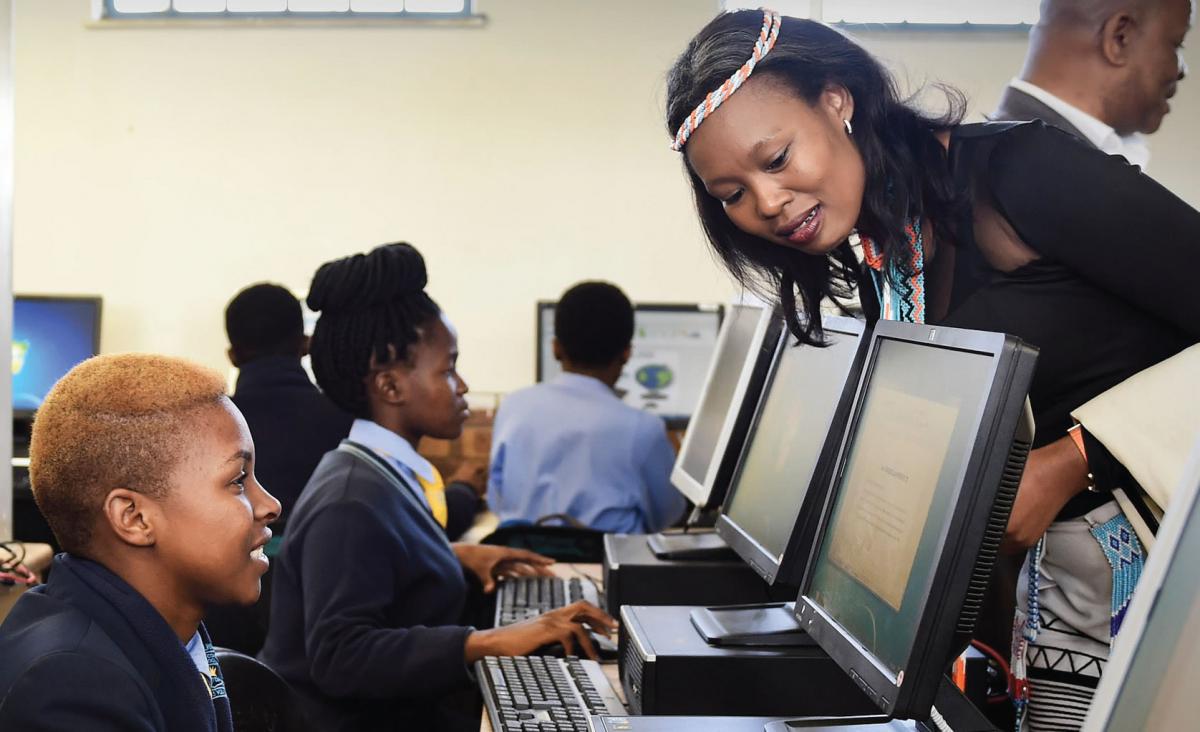
Deputy Minister of Communications Stella Ndabeni-Abrahams recently handed over 25 desktop computers and other teaching aids to the school during a campaign to make information technology (IT) fashionable in rural schools.
This was made possible through various partnerships. The Land Bank donated 25 desktop computers and Vodacom donated a mindset learn broadcasting appliance and tele/fax modem to the value of over R97 400.
The tools are expected to improve teaching and learning in the previously disadvantaged school.
Deputy Minister Ndabeni-Abrahams handed over the items in line with the National Broadband Policy of 2013 that seeks to ensure that South Africa connects by creating opportunities and ensuring inclusion in schools, health facilities and public sector facilities.
In terms of the policy all schools should have access to broadband at a speed of 10 Megabytes per second by 2020.
MEC for Rural Development and Agrarian Reform Mlibo Qoboshiyane donated seedlings and an agricultural starter pack to the school.
The Eastern Cape AIDS Council, working with Soul City and loveLife, are helping the school to deal with various social ills learners face.
Two tablet computers were donated to the school’s principal and deputy principal as a token of appreciation for their concerted endeavours to drive the school in the right direction.
School Principal Wisizwi Billie appreciated the efforts made by the Department of Communications, in partnership with the private sector.
He said the computers would assist in providing tremendous exposure for learners, academically and otherwise.
Yoliswa Blom works for Government Communications (GCIS) in the Eastern Cape.
No more queues for patients
No more queues for patients JoyPatients on chronic medication no longer have to worry about taxi fares or spending the better part of their day waiting in a queue for their medication.
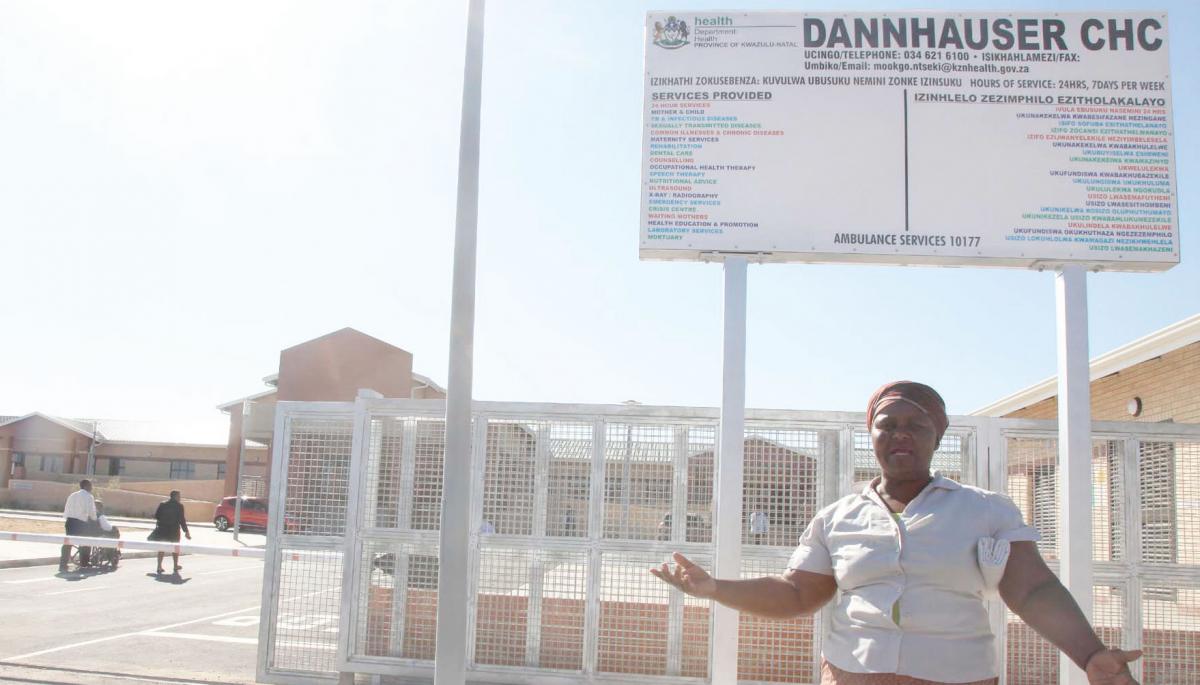 The Central Chronic Medication Dispensing and Distribution programme, being piloted at National Health Insurance sites, gives patients easy access to their chronic medication at collection points closer to their homes.
The Central Chronic Medication Dispensing and Distribution programme, being piloted at National Health Insurance sites, gives patients easy access to their chronic medication at collection points closer to their homes.
Stable patients on chronic medication can now collect their medication at the pilot sites and participating private service providers.
These pilot sites are in the districts of OR Tambo (Eastern Cape), Gert Sibande (Mpumalanga), Vhembe (Limpopo), Pixley ka Seme (Northern Cape), Eden (Western Cape), Dr K Kaunda (North West), Thabo Mofutsanyane (Free State), Tshwane (Gauteng) as well as uMzinyathi, uMgungundlovu and Amajuba (KwaZulu-Natal).
Patients can also choose any one of the private pick-up points that have been contracted by the department.
The service providers would have already received packaged medication from the Department of Health and all they would have to do is hand over the parcel once the patient’s identity has been verified.
Patients will only have to visit the clinic every three months for check-ups and consultation. Health Minister Aaron Motsoaledi said this would help to reduce waiting times at clinics.
“We are asking those patients who are stable and do not really have to see a doctor or a nurse, but have to visit a health facility for their monthly supply, to register at a collection point where they can collect their medicines without having to queue or wait,” said Minister Motsoaledi when presenting the department’s Budget Vote recently.
Such patients do not have to queue for a file. They simply go to the collection point and produce a card (which they would have found in the pack they collected on their previous visit), or show an SMS, which would have been sent to them by the department informing them that it’s time to collect the medication.
Patients no longer have to take a day off work. They can choose when they want to fetch their medication as most of the pick-up points operate after hours.
“Presently we have 383 989 patients on the system and we are targeting 500 000 people,” said the Minister
According to the Department of Health, clinics that have already started piloting the programme have fewer queues.
A state-of-the-art community health centre for Dannhauser
A state-of-the-art community health centre for Dannhauser JoyThe new R166 million state-of-the-art community health centre in Dannhauser, KwaZulu-Natal (KZN) has brought much-needed health services to the area.
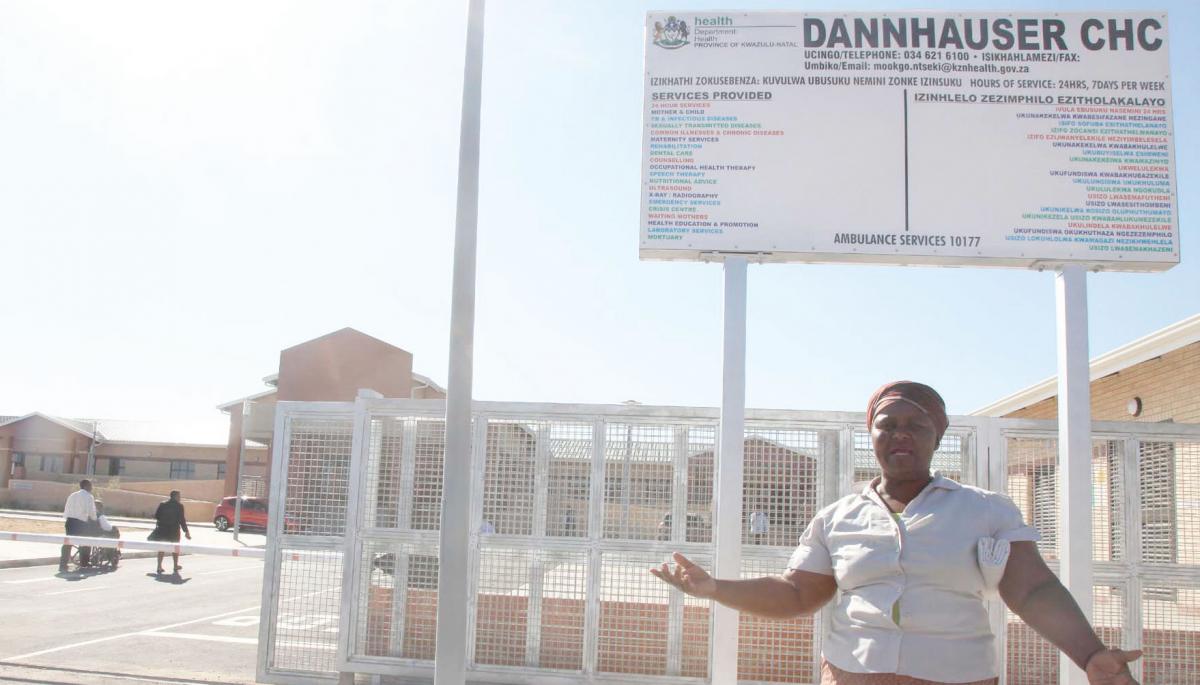 KZN Premier Senzo Mchunu and KZN Health MEC Sibongiseni Dhlomo recently opened the 39-bed Dannhauser Community Health Centre.
KZN Premier Senzo Mchunu and KZN Health MEC Sibongiseni Dhlomo recently opened the 39-bed Dannhauser Community Health Centre.
The facility, which was celebrated with much fanfare by the community, will serve 103 389 people, 90 per cent of whom do not have medical aid. It will also serve as a referral facility for 10 of the municipality’s clinics, including the Thandanani, Nellies, Durnacol and Sukumani clinics.
Residents of Dannhauser no longer need to travel 30 km to Newcastle Provincial Hospital or 40 km to Madadeni Hospital to access healthcare.
Community member Philemon Mofokeng said he had to spend R90 to go to Newcastle Hospital but now he can go to the clinic and come back early for only R6.
“This facility, provided to us by our government, is going to help us a lot and we are very thankful for it,” he said.
The facility offers the same services as a district hospital, including consulting rooms, tuberculosis (TB) management, dentistry, X-rays, maternity care, a pharmacy, emergency medical service base, a mortuary and single-room residence for nurses.
“This impressive community healthcare centre is well deserved by the people who are now liberated and have the dignity which was not afforded to them before” said Premier Mchunu.
He added that the delivery of the centre complements the good work he had witnessed earlier that day when he visited the new expanded Voluntary Counselling and Testing Clinic at Newcastle Provincial Hospital.
Community health worker Sibongile Msimango said they are very happy to have this in the area: “Patients had to travel long distances to Madadeni hospital and many of our people came back without getting any help because the hospital is full,” she said.
This facility started operating from a small room near the Paediatric Outpatient Department and was run by one professional nurse and two HIV counsellors. With the increasing number of clients being tested and remaining in care, additional staff were assigned and space became a challenge.
The new facility now offers various services, including HIV counselling and testing (HCT), antiretroviral (ARV) initiation, TB and nutrition management and a pharmacy.
Speaking at the facility, the Premier said “women and children are really receiving quality healthcare, especially with the availability of a highly qualified and committed paediatrician who even goes out to assist all of the Amajuba Health District’s facilities.”
The Premier urged the residents of Amajuba District to make good use of the facilities provided for them and expressed disappointment about the low number of people who are going for screening and testing for HIV in the district.
HIV counselling and testing (HCT)
When you go for HCT you will:
• be counselled, and informed on the nature of HIV&AIDS, sexually transmitted infections (STI), and TB
• be encouraged to adopt a healthy lifestyle to prevent development of other non-infectious diseases
• be tested for HIV and screened for TB and other non-communicable diseases
• learn how to prevent HIV/AIDS and TB-related deaths
• help prevent new HIV and TB infections
• help break the stigma attached to HIV and AIDS and TB.
(Source: https://www.gov.za/about-government/government-programmes/hiv-counselin…)
IDC boosts local cattle farmers
IDC boosts local cattle farmers JoyThe Industrial Development Corporation (IDC), in partnership with the Gauteng Department of Agriculture and Rural Development (GDARD) and the University of Pretoria, is giving cattle farmers across the country a foundation in cattle farming.
This is occurring under the auspices of the corporation’s Gauteng IDC Nguni Cattle Development Trust. It aims to reintroduce the Nguni breed in black farming communities in Gauteng. The long-term objective is to develop an international niche market for producing Nguni cattle
products by these communities.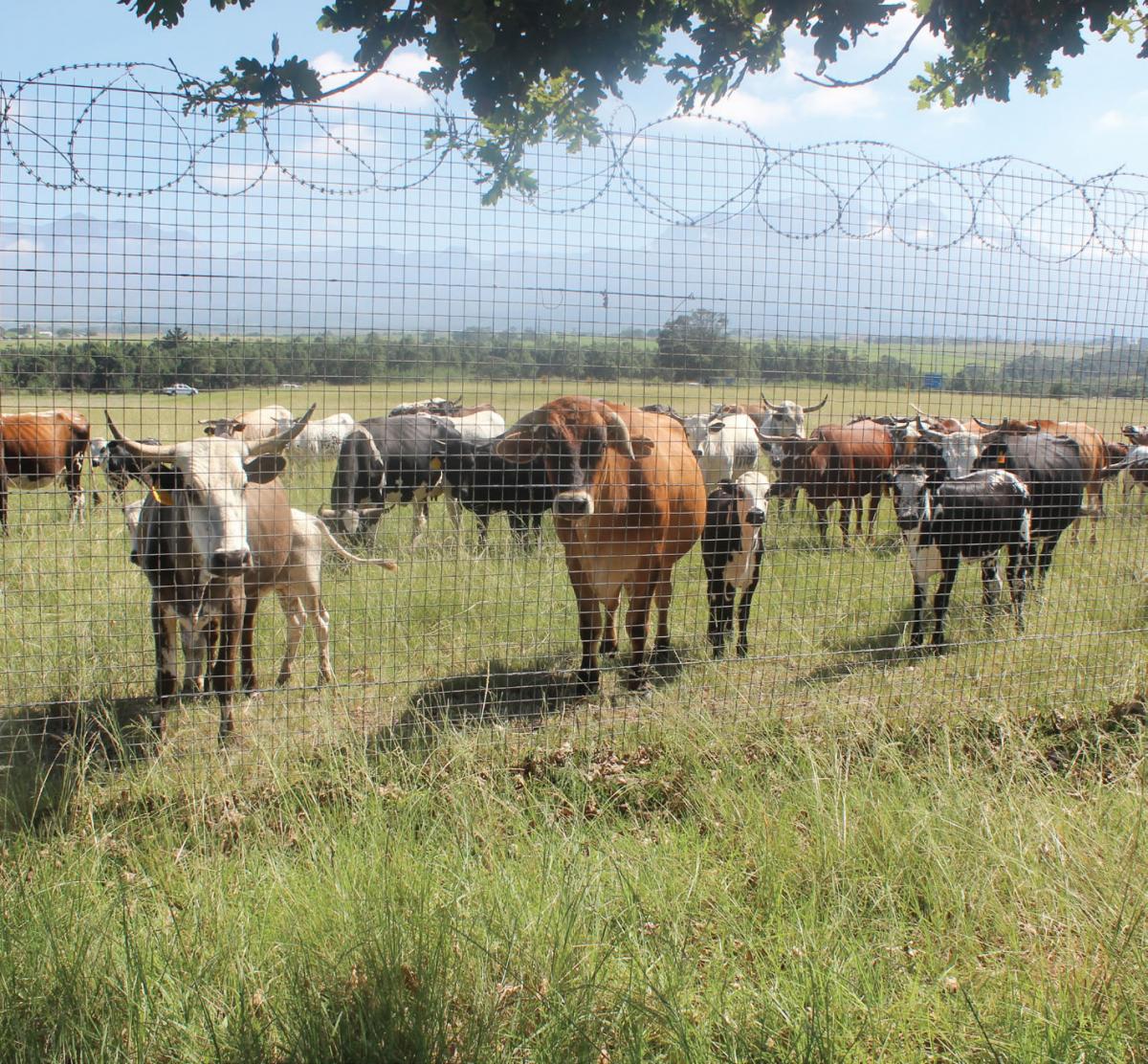
Though the initiative started in Gauteng, project manager at the IDC Tommy Mohajane said due to its popularity and success, it is spreading to other provinces. The programme started in the Eastern Cape in 2004. “I hear that the next province is KwaZulu-Natal and this is due to its success and impact,” he said.
Unlike commercial banks, the general public do not need surety to apply for the Nguni breed project. Government officials, IDC and University of Pretoria staff members do not qualify.
“All those who are attached to our trustees do not qualify. We don’t want corruption in this project and we are targeting mostly people in the rural areas and people who are passionate about cattle farming.”
Under the initiative, each potential farmer receives 30 pregnant Nguni females and one Nguni bull as a conditional loan from the Trust. One of the conditions is that the loan must be repaid within five years of being given the cattle.
The loan has to be repaid by tendering a herd equivalent (in number and quality) to the initial herd received, or through payment of a sum of money equivalent to the value of a similar herd as at the date of repayment to the Trust.
He said the reason the IDC chose Nguni cattle is that the breed can withstand harsh weather conditions and drought. “The other reason is that this breed is indigenous to South Africa and we want to reintroduce this breed to farmers.”
People who qualify should meet strict criteria and among those conditions, they should have a farm of 600 hectares with sustainable water supply.
Mohajane added that the reason they partnered with the University of Pretoria is that the institution can train people who will receive cattle from the IDC.
“The university provides training in basic livestock and bookkeeping. People should not keep records in their heads; we want proper record keeping,” he warned.
For more information contact: 011 240 2500 or visit the www.gdard.gpg.gov.za
Young farmer too resilient to chicken out
Young farmer too resilient to chicken out JoyWhen David Mphuti dropped out of university, his dream of becoming a mechanical engineer ended. He was without a qualification and had no job prospects.
He had to go back home and decided to do what he believed he was destined to do: farming.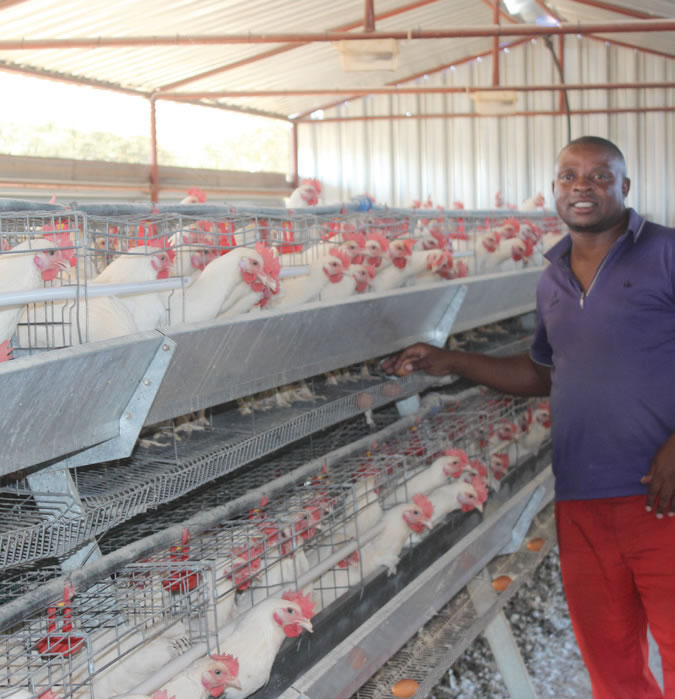
Today, with the help of the National Empowerment Fund (NEF), he runs a successful chicken feed manufacturing farm and supplies many small chicken farmers in and around Free State.
He is also negotiating supplying chicken to Pick n Pay, one of the biggest supermarket chains.
Mphuti’s love for farming goes back to when he was growing up in QwaQwa in the Free State. He says farming was the only thing he knew and although things were difficult when he dropped out of varsity, he always knew that it would be his way out of poverty.
“For me, farming was a lifestyle. Even when I was going through that difficult period - at the back of my mind I knew that I would go back to it.”
Mphuti and a few farmers around Welkom started the Dihoai Farming Co-operative in 2006, operating a small feed mill and broiler project on their farm. The co-operative has been producing feed for its own broiler projects and selling small quantities to neighbouring chicken farms since it started.
He currently employs 30 people from around Welkom.
It was tough in the beginning, until Mphuti approached the NEF in 2011 for funding and received a R8.5 million loan. The funding was used for construction costs and working capital and to buy machinery.
Mphuti has a good relationship with the NEF. “So far we have been working together without any problems and I’m grateful for the contribution it has made to this farm.”
He says small and emerging black farmers can succeed by working together, especially in the same region.
“The only way to succeed is to club together and assist each other where we can, like we are doing here. We sell chicken feed at a lower price to small and emerging farmers around Welkom.”
Groundbreaking deal for former farmworkers
Groundbreaking deal for former farmworkers JoyThree former farmworkers from Calvinia, Northern Cape, are beneficiaries of one of the largest land redistribution deals in the Namakwa District Municipality.
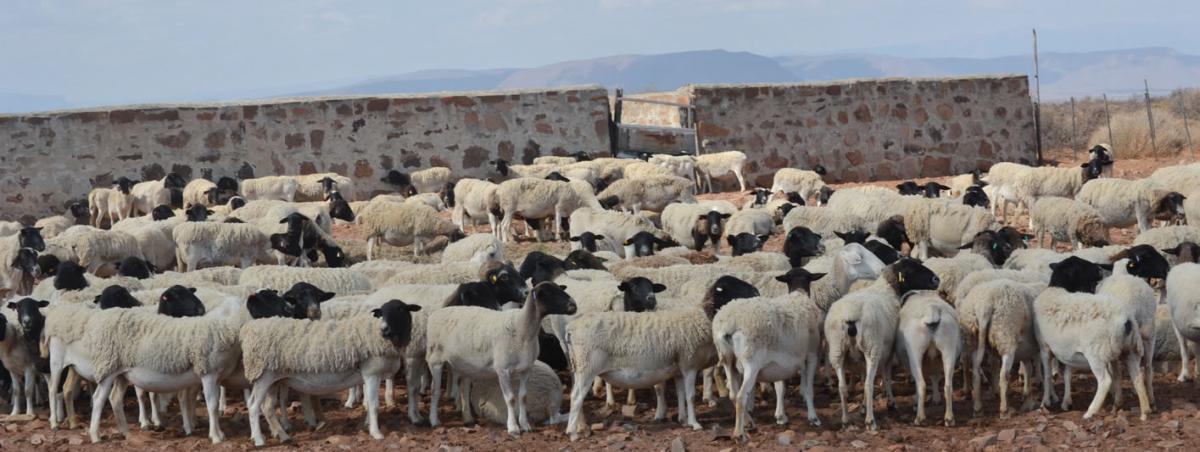 As part of the deal, the Department of Rural Development and Land Reform in the Northern Cape has bought five farms measuring more than 11 000 hectares at a cost of R10.9 million. The farms were officially handed over to the beneficiaries at a celebration ceremony held on the farm recently.
As part of the deal, the Department of Rural Development and Land Reform in the Northern Cape has bought five farms measuring more than 11 000 hectares at a cost of R10.9 million. The farms were officially handed over to the beneficiaries at a celebration ceremony held on the farm recently.
Once the transfer of the farms was complete, government bought 752 sheep worth more than R1 million for three former farmworkers to help them become successful farmers.
The department also arranged for the neighbouring commercial farmer, Boy Boardman, to help the beneficiaries as their mentor/strategic partner.
He will help them with the overall management of the farm, day-to-day operations on the farm including financial management and the balancing of books. He will also train them and ensure skills transfer so that they can farm on their own in the future.
As part of the deal, the workers’ close corporation, strategic partner and the government formed a tripartite agreement model with the 50-50 profit/risk/loss sharing among the parties.
The beneficiaries will still receive their salaries for a period of five years until the business starts making profit.
Through the tripartite agreement model, new farmers get partnered with experienced farmers to get technical advice and financial management skills to help them become successful farmers.
The Director of Land Reform at the department Kgalalelo Marintlhwane said that the project is a high impact project. “Farm workers are the most vulnerable people,” she said.
Jan Jonker, a worker for six years, called the opportunity a dream come true.
“I’ve always wanted to own a piece of land and I’m happy that I will leave something for my children when I pass on,” he said.
Jonker added that he still had to get used to the idea that he was no longer a farmworker and promised to work hard to make a project a success.
Working on a farm has taught him about sheep breeding as well as general maintenance on the farm.
“I hope that the skills I have acquired from the previous owner will help me in managing the farm,” he said.
*Moeketsi Ntsane works for the Department of Rural Development and Land
Offenders to give back to communities
Offenders to give back to communities JoyJustice and Correctional Services Minister Michael Masutha says efforts by correctional services facilities to make a positive contribution to community development are progressing well.
 Each correctional centre will adopt a community to share the expertise in food production it has developed over the years.
Each correctional centre will adopt a community to share the expertise in food production it has developed over the years.
According to Minister Masutha, thousands of offenders are involved in community infrastructure and food production projects that seek to plough back, provide some form of reparation for their crime, and strengthen the interface with victims, families, communities and various stakeholders.
He said these would include:
- community food gardens for old age homes and poverty-stricken communities
- the cleaning and maintenance of public and community infrastructure such as community halls, schools (with over 300 adopted by correctional centres for ongoing support), graveyards, churches, state hospitals, old age homes, day care centres and institutions for abused women and children
- contributing to building houses and providing furniture for victims of crime and destitute families in partnership with other stakeholders.
Bringing courts closer to the people, arresting long queues
Minister Masutha said access to justice for all means bringing courts closer to the people.
He said the justice department was working on a model that would see people no longer travelling long distances to access court houses. “The Department has embarked on a process of realigning magisterial districts with municipal boundaries so that communities can access justice services in areas where they live.
“The project was successfully implemented in Gauteng and the North West in December 2014 and will be rolled out to Limpopo and Mpumalanga later this year”.
Government will continue building courts on the outskirts of towns and cities as well as in rural villages to expand justice services to previously marginalised communities.
“We hope to maintain the norm of building on average two new courts per year so that we can reduce the backlog of court infrastructure in many parts of the country.
“During 2015, we will proudly open the doors of the first High Court in Limpopo and a high court in Mpumalanga will follow in 2016,” he said.
Meanwhile, the Minister said that the department was improving the maintenance system to reduce long queues and ensure that rightful beneficiaries received their money in time and directly in their bank accounts.
He said that more maintenance beneficiaries were using the electronic fund transfer (EFT) facility. This means that their money is paid directly into their bank accounts.
“In the financial year 2014/15, a total of R1,97 billion was paid to maintenance beneficiaries through the EFT.
“In addition, we have tabled the Maintenance Amendment Bill before Parliament to deal decisively with maintenance defaulters,” he said.
Minister to launch Operation Hira/Qasha/Thapa/Thola
Minister Masutha said that during his walkabout in correctional services centres, he had noticed ineffective recruitment methods.
As a result, he planned to launch a four-month recruitment drive with the aim of:
- building partnerships with academic institutions, sector training authorities (SETAs), other state organs and professional bodies for heightened collaboration in accessing databases of qualified people with scarce skills
- each regional commissioner and branch head would be expected to sign a performance agreement to reduce their vacancy rate by at least 80 per cent
- recruiting 3 096 unemployed youth for the learnership training programme at justice colleges to contribute to fighting youth unemployment and building hope and trust in a better South Africa
- organising a series of Job Fairs across the country, to expose the unemployed youth to career opportunities within Correctional Services.
The Department exceeded its target of training officials by 48 per cent, going from 16 500 to 24 548. We will train a further 18 000 officials this financial year, the Minister said.
Minor offenders’ criminal records might go
Meanwhile, Minister Masutha wants to give former offenders a second chance in life.
Speaking ahead of the department’s Budget Vote speech recently, Minister Masutha announced that the department intends to amend a section of the Criminal Procedures Act to remove offenders’ criminal records. The Minister said he would hold a national consultative conference this year to talk about a possible amendment to the Act to give offenders, who committed minor crimes, a second chance.
“Given that the 2008 amendment to the Criminal Procedure Act, which came into effect in May 2009, has effectively seen its sixth year this month, it is perhaps time to open dialogue on possible further amendments. “Our focus will remain on those who committed minor and non-violent crimes. The idea is not to compromise public safety, but to enhance it,” the Minister said and added that Correctional Services remains an integral part of the criminal justice system.
“A cardinal indicator of success when correcting offending behaviour and rehabilitating offenders is their successful and sustainable reintegration into their communities.
“In numerous interactions with former offenders, who have remained law abiding citizens for years, the matter of criminal records and their detrimental effect on successful social reintegration has consistently been raised,” he said.
The Minister said the consultative conference was part of difficult policy discussions in which society needed to participate.
Currently, erasing criminal records can happen in various ways, one of which is a Presidential pardon. However, this can take up to 10 years to happen.
“The real issue is whether we can find a way to do this that’s quicker than ten years because it’s a long time in the life of a young person.
“It is obviously a sensitive matter because on the one hand society may feel it needs to be protected from someone who has had a brush with the law and is being unleashed into the community.
“We can’t deny people the opportunity to be reintegrated back into the community because you are then actually undermining your own programmes to restore the positive side of their humanity,” he said.
To advance the department’s focus on crime prevention, correctional services will adopt a community and share its expertise in food production with them. “We will teach communities modern and advanced models of food production and expose unemployed youth to technical skills, such as furniture making, motor vehicle repairs and construction,” he said.
More good news for the department
- year, the department has increased its intake of young graduates into its learnership programme to 800 in a bid to impart skills to young graduates and thereby enhance their opportunities for employment.
- During 2014/2015, the National Prosecuting Authority (NPA) achieved a 91 per cent conviction rate in the High Courts, 76,6 per cent in Regional Courts and 94,2 per cent in the district courts. Conviction rates for sexual offences and complex commercial crimes stood at 69 and 94,3 per cent respectively. A conviction rate of 95 per cent was achieved in respect of cybercrime.
- The Electronic Monitoring System (EMS), which was launched in July 2014, marked another milestone in the modernisation of correctional services. Since its rollout, 1 009 people have been tagged with 604 persons currently being monitored by this system. The EMS has enabled the department to effectively track an offender, or an awaiting trial person effectively at all times. During 2015/16 , at least 1 000 people are to be tagged at any given time.
New system to improve access to justice
New system to improve access to justice JoyThe new case-flow management system implemented by the judiciary is easing the burden on court rolls and reducing the long wait for cases to be heard in court.
Case-flow management involves assigning and allocating cases to a judicial officer at the earliest opportunity so that the case can be managed efficiently and effectively to ensure it is finalised quickly.
A judicial officer is responsible for and has the power to facilitate, arbitrate, preside over, make decisions and take direction with regard to the application of the law.
According to the convener of the new system and Supreme Court of Appeal Judge Stevan Majiedt, the system has reduced the clogged case roll.
“A very good indication is the time parties have to wait to be assigned a trial date. In the larger divisions they would have to wait in excess of two years to be assigned a trial date and cases could take in excess of three years to finalise, due to postponements,” says Judge Majiedt.
A Judicial Case Flow Management Committee (JCFMC) consisting of judges from all divisions of the High Court, Supreme Court of Appeal and the Constitutional Court leads the new system.
Pilot project
In 2012, a pilot project was launched in three of the biggest court divisions in the country, comprising five pilots sites, namely the high courts of Gauteng (North and South), the Western Cape and KwaZulu-Natal (Pietermaritzburg and Durban).
Judge Majiedt says since the implementation of the pilot, there has been a decrease in the waiting period of trials and in the number of cases on the roll in the three divisions, particularly at the Gauteng North High Court (Pretoria).
“In Gauteng, the waiting period for a trial date was reduced from one year to nine months at the start of the project. The Gauteng North High Court had 224 921 outstanding cases on the civil roll, which were reduced to 144 027 by February 2015.
“In the Western Cape, once certified trial ready, a trial date can be allocated for the following term. Before the implementation of case-flow management, the waiting time for the allocation of a trial date was in excess of two years.”
Due to its success at the five pilot sites, the judiciary is planning to implement the system at lower courts.
“Separate from the pilot project at high courts, case-flow management has been taking place at the lower court level but not under the same directives as the pilot project. The Chief Justice has expressed his wish to have the lower courts included in the project.
“Once the drafting committee has finalised its work the JCFMC will, with the Magistrates’ Commission and the leadership of the magistracy, investigate how best to implement judicial case flow management at lower courts,” explained Judge Majiedt.
Dti saving jobs, seeking export opportunities
Dti saving jobs, seeking export opportunities JoyBudget votes
The Department of Trade and Industry’s (the dti) efforts to revive the clothing, textiles, leather and footwear sector are already showing good signs of recovery.
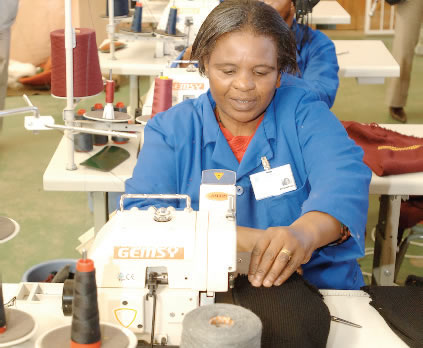 Speaking during the department's budget vote recently, Minister Rob Davies said over the past few years, the department has managed to revitalise the struggling sector to set it on a path towards growth – a move that has led to over 60 000 jobs being saved.
Speaking during the department's budget vote recently, Minister Rob Davies said over the past few years, the department has managed to revitalise the struggling sector to set it on a path towards growth – a move that has led to over 60 000 jobs being saved.
He said through the department’s Clothing and Textile Competitiveness Programme, the sector has been turned around with jobs saved and new ones created especially in KwaZulu-Natal and the Western Cape.
“Not so long ago, the demise of this sector was regarded as a foregone conclusion.
“In this House, we heard some members imploring us not to support what was seen as a lost cause.
“So-called ‘soft-touch industrial policy’ was cited as the way to go. In other words, abandon support for sectors which were for one reason or another experiencing difficulties,” he said.
He pointed out that according to the Industrial Development Corporation’s recent review of the programme:
- R3,7 billion had been approved under the programme, of which R2,6 billion had been disbursed since inception in 2010
- the share employment in the sector had gone up from 28,8 per cent in 2009 to 38,8 per cent in 2014 as a result of compani drawing on the competitive programme.
“The programme’s interventions have already demonstrably contributed to improved overall competitiveness, sustainability and employment growth for its recipients.
“At a cost to date of R2,6 billion disbursed, the programme has facilitated the creation of R3,9 billion in manufacturing value addition as well as saving over 68 000 jobs and achieving a total net gain of 6 900 new jobs,” he said.
Meanwhile, the Minister said another flagship programme that is one of the department’s initiatives to help support competitiveness of smaller players in sectors dominated by larger corporates – the Manufacturing Competitiveness Enhancement programme – was contributing to saving thousands of jobs.
The programme has been running for three years and its performance has remained robust.
“Since its inception, just three years ago this month, it has provided support for a total of 236 projects across a wide range of sectors, with an investment value to date of R3,8 billion and the maintenance of an estimated 28 000 jobs,” he said.
Interventions produce results, save jobs
- In September last year, Nampak unveiled a R1,2 billion glass furnace bottling facility supported by government’s 12i Tax Allowance Incentive Programme
- AbagoldLimited, a local Hermanus-based company that farms abalone, announced a significant expansion in December 2014 with support from the Dti Aquaculture Development and Enhancement Programme
- Over the past financial year, the film and video sector contributed R3,5 billion to the economy, whilst supporting 25 000 jobs and the Film and Television Production Incentive underwrote 137 film productions.
Local government hard at work
Local government hard at work JoyBudget votes
Corporative Governance and Traditional Affairs Minister Pravin Gordhan has called on citizens to pay for basic services that they receive from municipalities.
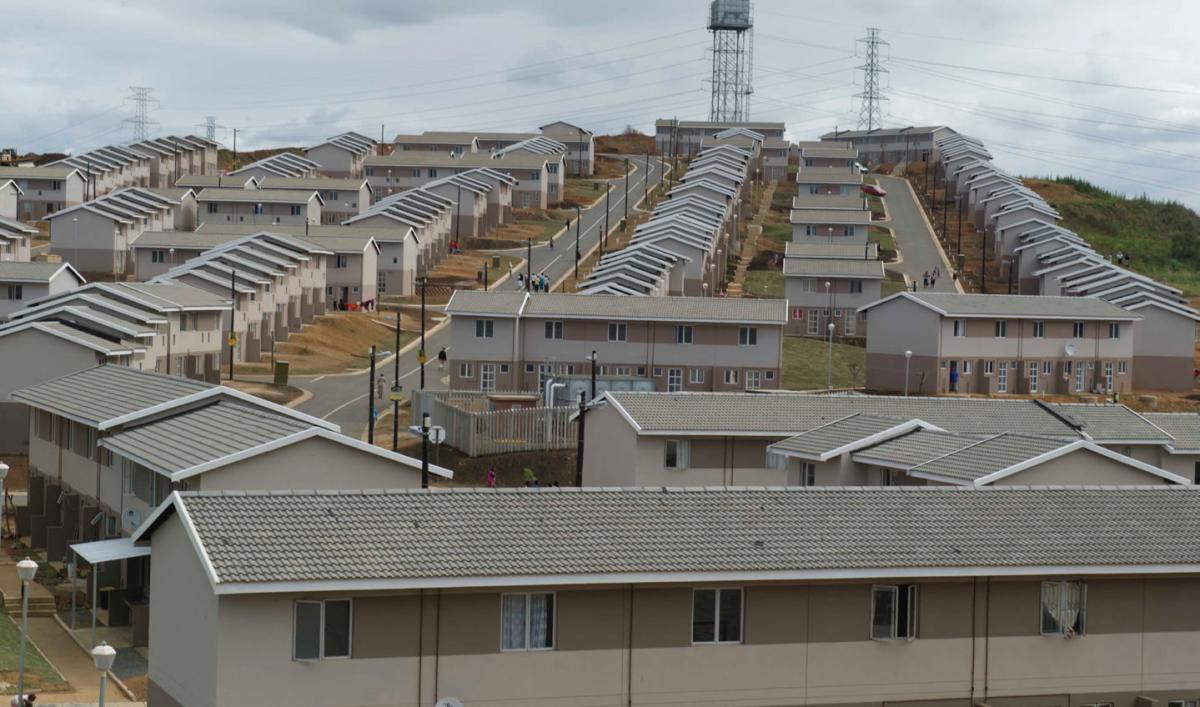 The Minister said that for municipalities to remain sustainable, all residents must pay their equitable share for receiving electricity or other services like water.
The Minister said that for municipalities to remain sustainable, all residents must pay their equitable share for receiving electricity or other services like water.
The Minister said this following a threat by National Treasury to withhold the equitable share allocations to municipalities that owe Eskom and the National Water Board millions of rands.
“We need to widen the payment culture in South Africa. We cannot have a situation where part of our communities are saying they are going to receive a public service; they are going to consume public goods but they are not going to pay for either or all of it.
“We believe all South Africans must pay their fair share in relation to the service that they consume,” he said.
The Minister’s statement cames after the news that some residents, for example residents of Soweto, had reportedly refused to pay for the electricity that they receive.
As a result of residents defaulting on their payments or not paying for their services completely, municipalities in turn owe Eskom billions of rands.
Some 59 municipalities have been identified by National Treasury as those that might have their equitable share withheld.
Parliament’s Select Committee on Appropriations has expressed concern over the threat from National Treasury.
Minister Gordhan said all parties such as his department, municipalities and Eskom would sit around one table to discuss solutions and map out a way forward.
“The equitable share is currently being released.
“If we don’t get cooperation from citizens and the municipalities themselves, we won’t find ourselves in a sustainable situation.
“The important fact though is that municipalities should not be scapegoats. Not all of Eskom’s problems are from municipalities…”
The Minister said, meanwhile, that it was disturbing that it was common practice among some municipal officials to not pay for services.
“We equally recognise that there has been some manipulation of indigent lists, meaning where indigent individuals are entitled to services in terms of government services, we find civil servants, business people, and politicians entering their names on the indigent lists which means that they then become exempt from what they should be paying for.
“That kind of irresponsibility surely must be unacceptable,” he said.
Department to strengthen monitoring of service delivery
Six months ago, President Jacob Zuma launched ‘Back to Basics’, a strategy that would have the Corporative Governance Department focus on a number of issues, including listening to residents to get feedback on service delivery, refuse collection and pothole repairs as well as governance and financial management.
The Minister said as part of the strategy, every second month municipalities now reported to the department whether they were meeting their key performance indicators as per their delivery targets.
He said the content of the reports was verified through physical inspections at municipalities to confirm that potholes, for example, were indeed repaired.
The use of technology, where residents were asked to use their mobile phones or other devices, to report service delivery or non-delivery was also being implemented, the Minister said.
He pointed out that municipalities that were in a bad position as far as service delivery was concerned had started moving towards the category of those that were improving or better off ever since the strategy had been implemented.
Community Work Programme providing work opportunities
The Minister said it was important to ensure that the lion’s share of the Community Work Programme (CWP) went towards providing work opportunities to a larger number of participants.
He said transversal tenders for the procurement of items that are required across CWP sites are to be instituted.
With transversal procurement arrangements, the wage component will stretch further to ensure that more participants, their families and communities, are cushioned against the adverse effects of poverty and unemployment.
“The Community Work Programme continues to alleviate the effects of poverty and unemployment and to restore dignity among our poorest citizens through community-based work opportunities that provide income support.
“Likewise, the equitable representation of youth, women and people with disabilities in the programme will continue to receive priority attention,” he said.
Achievements
- Following the implementation of “Back to Basics” last year, efforts to improve the response rate of municipalities have yielded results. An average of almost 58 per cent of municipalities (161 out of 278) now report regularly.
- The District Business Development Forum, introduced in 2013/ 14, is already reaping economic rewards, and thousands of jobs have been created in different regions in collaboration with the private sector, and most of those employed were young people.
Social development initiatives focus on children
Social development initiatives focus on children JoyBudget votes
Social Development Minister Bathabile Dlamini has widened the social security net for child grant recipients.
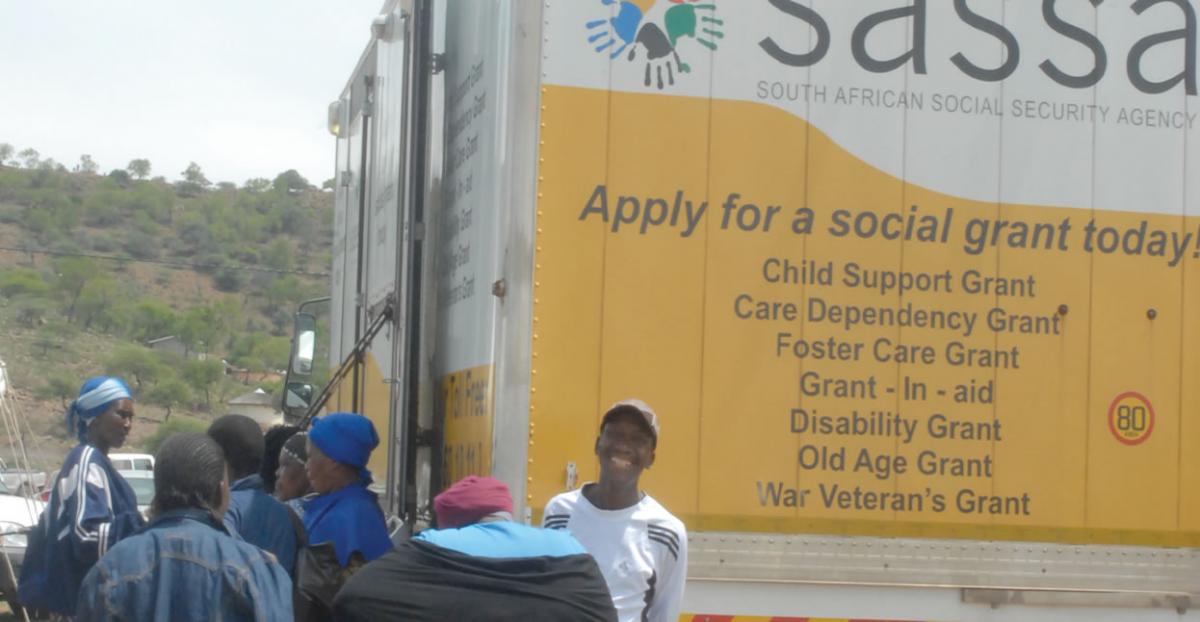 The Minister said government intends to extend the child support grant beyond the age of 18 for children who continue attending school after they turn 18.
The Minister said government intends to extend the child support grant beyond the age of 18 for children who continue attending school after they turn 18.
She said this would not include all children, and only targeted children would be eligible for the support depending on their circumstances.
This could range from orphans to those in child-headed homes, the Minister said.
“The child support grant is a huge investment in human capital development, and to this extent we need to ensure that it is not terminated when the child turns 18. To this end, we intend to work with families to save a portion of the child support grant every month to be available when the child turns 18.
“Similarly, we have made notable strides in increasing the uptake of the Older Persons’ grant by amongst others increasing the means test threshold to ensure that more elderly people benefit from the grant.
“The increase in the means test threshold brought in 82 000 new recipients of the Older Persons’ Grant in November 2014,” she said.
The Minister said the proposed increase will help children to remain with their siblings in the family home and within their communities.
Thokozani Magwaza, a Deputy Director-General at the department, said this would not include all children.
Magwaza said the children who would benefit were those aged 18 to 21 and who were still at school when they turned 18.
“The reason why we are doing that is that on the foster care side, the foster care child when he turns 18 is not removed from the system; they carry on until they turn 21,” he said.
Brenton Van Vrede, an acting Deputy Director-General at the department, said this would cost not more than R3 billion to implement, and that the department was in talks with National Treasury on when it would be fiscally possible to implement it.
Social grants taking families out of poverty
Minister Dlamini said, meanwhile, that social grants are important as they help take vulnerable families out of the cycle of poverty.
The Minister said this in response to a question on the sustainability of social grants during a media briefing following her budget vote speech, which she tabled in Parliament recently.
My question has always been: ‘Is poverty sustainable?’
“Our social assistance focuses on vulnerable groups. Social assistance is for children, older persons, and people with disabilities.
“If you look at the number of children that are grant recipients, it shows that we are actually focusing on taking families out of the cycle of poverty. Our children who are grant recipients go to school but what is important is that they have a meal a day.
“Grants are not a luxury; they are a must for our people.”
Government prioritises early childhood development
The Minister said Early Childhood Development (ECD) remained a top priority for government as it contributes to good development of a child from an early age.
Cabinet approved the publication of the draft ECD Policy for public comment after it was regarded as a public good.
Once finalised, the policy will make it possible for government to provide a comprehensive package of services for children with special needs, children with disabilities and other developmental needs.
“Universal access to ECD services by all children remains uppermost in our minds, and the Department will continue to promote the establishment of non-centre-based ECD services to children in poor communities, rural areas, informal settlements, farms as well as children with disabilities,” she said.
The Minister also said that non-centre-based ECD services such as mobile ECD and toy library programmes are being rolled out in the provinces.
Similarly, efforts are being made to ensure that ECD infrastructure is adaptable to the needs of children with disabilities. No child must be left behind,” she said.
Ahead of delivering her budget vote speech at the National Council of Provinces (NCOP), the Minister handed over keys to the newly built Dalukhanyo ECD centre in KwaLanga township in the Western Cape.
The hand-over of the newly built centre, with three classrooms, a jungle gym and a food garden, came after the centre’s previous structure burnt down as a result of an electrical fault.
Speaking after the launch, the Minister said the re-opening of Dalukhanyo ECD centre was significant as it would ensure that the overall well-being of children – especially as they are mostly from disadvantaged backgrounds – would be well catered for.
Citizens need clean water and savvy sanitation
Citizens need clean water and savvy sanitation JoyTabling the Department of Water and Sanitation Budget Vote in Parliament recently, Minister Nomvula Mokonyane said the department is introducing no-flush toilets to communities.
While the new no-flush initiative would go a long way towards restoring the dignity of South Africans who have been using the bucket system in most informal areas, it would also help preserve water which is the country’s most valuable resource.
Minister Mokonyane said the department planned to transform the different approaches to sanitation.
Disposing of human waste through flush toilets that use drinking quality water is unwise and unsustainable.
“In this regard, we are currently looking at numerous technologies that will assist us to eliminate the use of clean drinkable water to dispose of human waste.
“We are determined to introduce low-water and no-water solutions as part of our efforts to deliver sanitation.
“Dry sanitation solutions must become the reality we work towards in both low and high-income households going forward. We will in the near future announce steps to introduce norms and standards for the provision of sanitation for application in the country.
This, the Minister said, would include using chemicals, grey water and other alternatives instead of using clean water.
She said her department was determined to educate people that it is not all about flushing.
The Minister said her department is piloting the interim sanitation solution toilets in KwaZulu-Natal, amongst other areas.
Minister Mokonyane also took the pilot to Khayelitsha in the Western Cape to mark sanitation and hygiene month.
“A decent sanitation solution does not mean a water borne solution.
“This is a sanitation revolution we will lead and champion as a department,” she said.
Department making progress in eradication of bucket system
The Minister said her department has made plenty of progress in eradicating the bucket system in formal areas.
“In 2014/15 alone, we successfully eradicated 20 560 bucket systems and we intend concluding the eradication of the bucket system programme in formal areas by December 2015,” she said.
The department’s target was to eradicate 27 000 bucket systems in formal areas like townships.
The Minister said, meanwhile, that her department and that of cooperative governance and traditional affairs had implemented the “back to basics” strategy to fast-track the delivery of water and sanitation.
She said 27 district municipalities and the Nelson Mandela Metropolitan Municipality had been identified as areas in need of interventions through this programme.
New plan to preserve water
The Minister said her department plans to complete a comprehensive water plan for South Africa with the aim of managing the country’s scarce resource.
The Minister said the plan, which her department aims to finalise during the current financial year, will aim to use innovative means and alternative technologies to manage water and sanitation in a country that she said needs to keep up with science and technology.
“In 2030, our country must enjoy water security and water supply that is reliable and sustainable.
“To this end, the management of our water resources wisely is paramount.
“We are surely turning a new page from the past where access to water was a privilege enjoyed by a few in South Africa to a future where all South Africans will enjoy access to basic clean water and sanitation,” she said.
Exciting water projects announced
The Minister said her department would continue to build infrastructure to make water accessible to all South Africans. This includes, amongst others:
- raising the Clanwilliam Dam wall in the Western Cape, at a projected cost of R2,4 billion which has commenced and is due for completion in 2018
- raising the wall of Hazelmere Dam as part of KwaZulu-Natal’s Mdloti Development Project at a cost of R528 million to meet the growing demand in the eThekwini and Ilembe District Municipalities
- planning the Groot Letaba River Water Development Project in Limpopo Province that will lead to the construction of a dam at Nwamitwa, and the regional bulk distribution of water for domestic use for approximately 425 000 affected people in the Greater Tzaneen Local Municipality
- commissioning the Luvuvhu River Government Water Scheme (Nandoni Bulk Water Supply) in stages to supply proximately 800 000 people in 380 communities in the Thohoyandou and Malamulele areas of Limpopo.
Informal sector growth needs radical economic transformation
Informal sector growth needs radical economic transformation JoyBudget votes
Small Business Development Minister Lindiwe Zulu said this year, the department will work hard to ensure that more support is given to the informal sector.
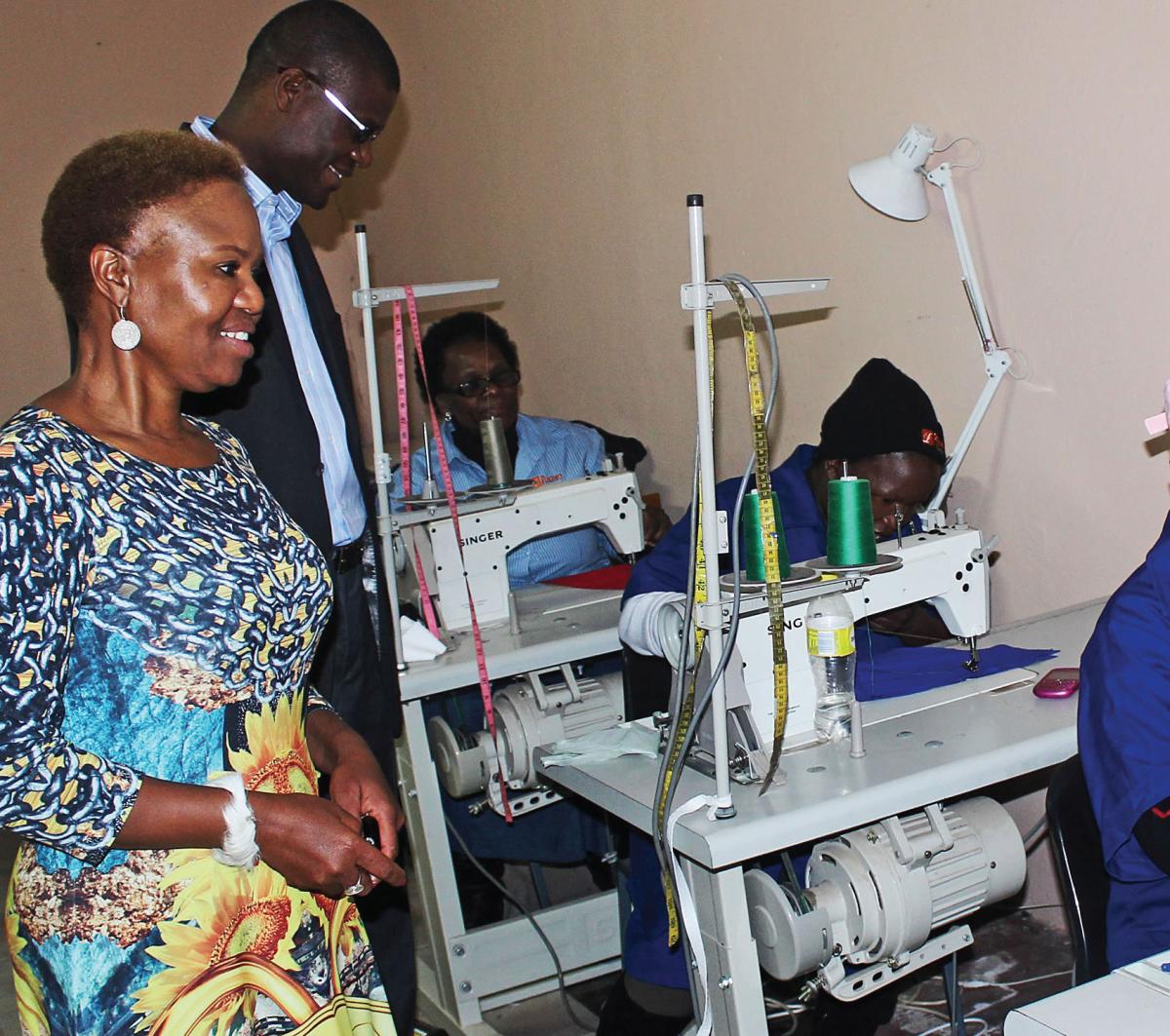 The Minister gave this undertaking when she tabled the department’s budget vote in Parliament recently.
The Minister gave this undertaking when she tabled the department’s budget vote in Parliament recently.
With the National Development Plan singling out the small business sector as one of the main job drivers come 2030, Minister Zulu said there was a growing need to ensure that township and rural economies – where many informal traders operate – be given enough support to thrive.
“Government, in particular local government, needs to ensure that they enforce by-laws without disenfranchising informal traders who have not had infrastructure support.
“We shall be working with metros, municipalities, the South African Local Government Association (Salga) and the National House of Traditional Leaders to review by-laws to be responsive to the local conditions in our townships and rural areas.
“The department will expedite the implementation of the National Informal Business Upliftment Strategy (NIBUS), which seeks to create an enabling legal and regulatory environment; provide finance and non-financial support; promote intergovernmental relations to deliver to the sector; encourage the role of private sector and support of informal trader organisations,” she said.
The Minister said Statistics South Africa’s “Survey of the employers and the self-employed (SESE)”, published on 14 August 2014, painted a disturbing picture.
The survey revealed that the informal sector contributed 15,8 per cent to total employment in 2014, a figure that prompted the Minister to say that for a long time the informal sector has not enjoyed full business support commensurate with its contribution to economic growth and employment.
According to the survey, the informal sector provides jobs for one in every four employed persons in Limpopo and one in every five persons in Mpumalanga, Eastern Cape and KwaZulu-Natal.
Almost nine out of every ten people running informal businesses are African.
The Minister said the statistics were evidence that more needs to be done to bring the informal sector into the economy.
“In partnership with the Wholesale and Retail Sector Training Authority (SETA), we shall upscale the Informal Traders Upliftment Project (ITUP) where currently we are piloting the support of 1 000 informal traders with skills and infrastructure nationally.
“The first training was conducted in Gamalakhe, Port Shepstone, in April, this year. R50 million has been allocated for the roll-out of the Shared Economic Infrastructure Facility and support for informal businesses generally.
More support for enterprises owned by youth, women, people with disabilities
With President Jacob Zuma having announced in his State of the Nation Address this year that government would set aside 30 per cent of all procurement towards supporting and growing youth-owned enterprises, the Minister said youth-owned cooperatives were being established.
She said that this would be done in partnership with the Department of Energy for young people in rural parts of the Eastern Cape and KwaZulu-Natal who were trained in the installation, maintenance and repair of solar-heated geysers.
“These youth cooperatives are now ready to participate in the growth of the renewable energy and green economy sectors. We intend to gradually massify this programme across the country,” she said.
On women-owned enterprises, the Minister said that women’s empowerment was high on the department’s agenda.
In that regard, she said that the Bavumile Skills Development Programme will continue to make it possible for many women to access formal training to improve the quality of their products.
“Participants are supported to either formalise their businesses or to access markets by participating in the national pavilions or supplying local markets,” she said. The department was also developing incentives and programmes that are directed at targeting this sector and that her department would work with relevant organisations.
Entrepreneurship schools on the cards
Minister Zulu also had good news for those who wished to get a formal qualification in entrepreneurship.
As part of government’s efforts to inculcate a culture of entrepreneurship, the department would work with the Department of Higher Education and Training to establish Centres for Entrepreneurship (CfE) programmes within the Technical and Vocational Education and Training (TVET) context.
“This programme seeks to increase the number of graduates who regard setting up their own business as a viable alternative to seeking employment.
“We have already launched some centres in Gauteng, Western Cape and Mpumalanga. We are in the process of expanding the programme to other provinces,” she said.
Health dept serious about healthy pregnancies
Health dept serious about healthy pregnancies JoyBudget votes
MomConnect, launched by the Department of Health, is yielding positive results.
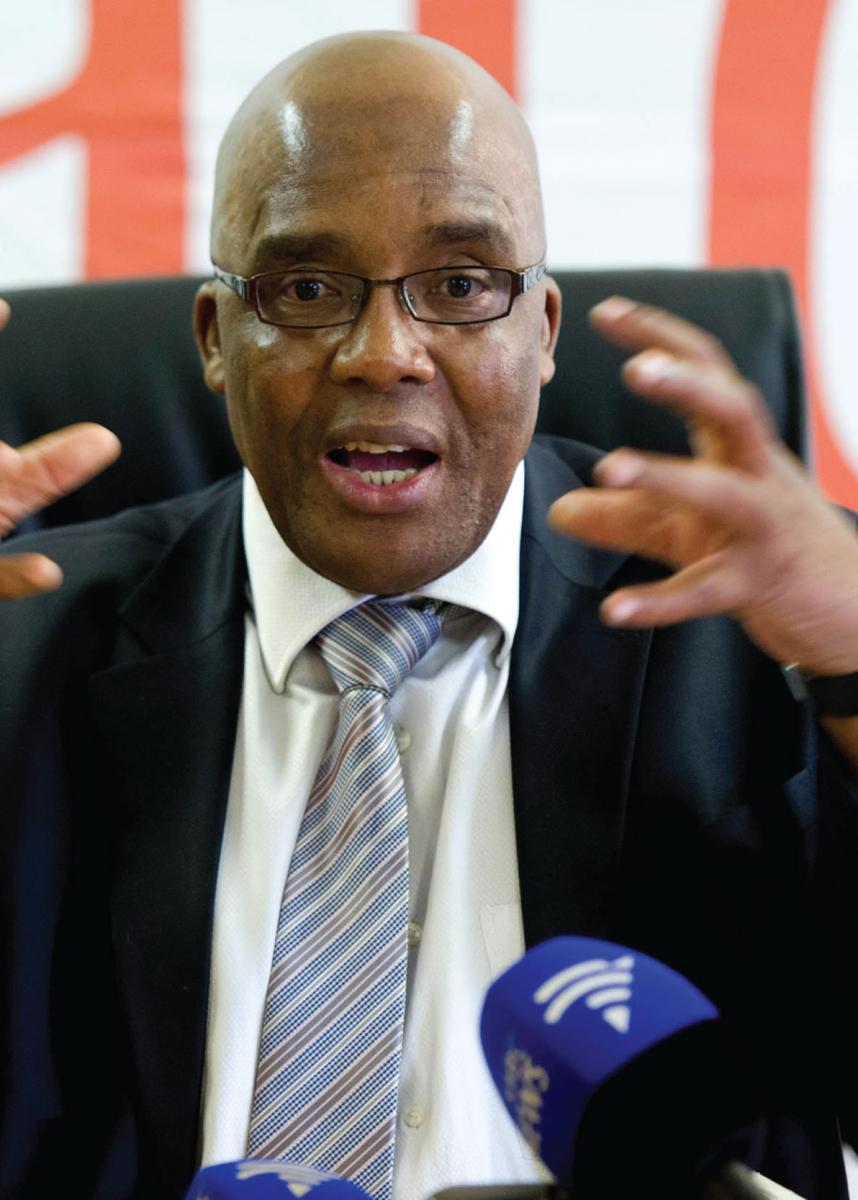 In August last year, the department launched the innovative project that uses cellphone technology to register pregnant women in the public and private sectors and empowers them to get all the information and instructions necessary for them to ensure a healthy pregnancy and deliver a healthy vibrant baby.
In August last year, the department launched the innovative project that uses cellphone technology to register pregnant women in the public and private sectors and empowers them to get all the information and instructions necessary for them to ensure a healthy pregnancy and deliver a healthy vibrant baby.
After delivering her baby the messages a mother receives will focus on the health needs of a new-born and will continue for up to one year after birth.
At the time of the launch, the Minister reported that the department and its development partners trained 10 300 health workers nationally to assist pregnant women to register.
The Minister said after eight months, the department has registered 383 354 pregnant women on the system. “It is regarded as the largest number in the world.
“Before we started, Bangladesh was regarded as a world leader after registering 100 000 women in 18 months, while other countries have only small pilot projects – nothing on a massive scale like we have,” he said.
He said the system does not only dish out information and instructions, but also enables pregnant women to ask questions and send unsolicited complaints and compliments about the department’s services.
“Unsolicited means that the woman sends in a complaint or a compliment without being asked, requested, provoked or prompted as is often done by researchers.
“This means we get to know about our services from the horse’s mouth unprovoked,” he said.
The aim was to ensure that 1.2 million are registered on MomConnect annually, said the Minister.
The project is funded over a two year period by partners that include the US Government with R49 million and Johnson & Johnson with R5 million.
Four cellphone operators including Vodacom, MTN, Cell C and Telkom are offering a 50 per cent discount on the SMS made that would be sent to pregnant mothers.
Major achievements
- 70 per cent - the decline in invasive pneumocococcal disease in children under the age of five. This after the health department introduced two new vaccines in 2009. Pneumococcal diseases include very dangerous diseases like meningitis and severe pneumonia.
- 66 per cent - the reduction in rotavirus diarrhoea hospitalisation in the first two years after the introduction of the rotavirus vaccine.
- 1 553 - the number of compliments from happy moms in eight months, registered on MomConnect. These included messages in which mothers expressed gratitude over good service by individual nurses who had performed above the call of duty.
| Number to dial from mobile phone | Who dials it? | Free to access? |
| *134*550# | Pregnant Woman, on her own phone | Yes |
| *134*550*1# | Pregnant Woman, on her own phone if she wants to opt out |
Yes |
| *134*550*2# | Nurse/ Clinic Representative on any phone (e.g nurse’s own phone; facility phone; mom’s phone) |
Yes |
| *134*550*3# | CHW on any phone (e.g CHW’s phone; mom’s phone) |
Yes |
| *134*550*4# | Pregnant woman, on her phone | Yes |
| *120*550*0# | Anyone during training on any phone |
No costs 20c/20sec |
Hair salon grows from strength to strength
Hair salon grows from strength to strength JoyWhen Nada Zwane (29) started selling Brazilian weaves out of the boot of her car to substitute her income, she had no idea it would motivate her to start her own business.
 Zwane is the owner of Vogue Premium Hair Salon based in Musgrave, Durban. The full-service salon offers everything from hairdressing to manicures. It stocks imported Brazilian and Parisian weaves and other hair products.
Zwane is the owner of Vogue Premium Hair Salon based in Musgrave, Durban. The full-service salon offers everything from hairdressing to manicures. It stocks imported Brazilian and Parisian weaves and other hair products.
Zwane told Vuk’uzenzele that the salon would not have been possible without the R50 000 Business Development Grant she received from the National Youth Development Agency (NYDA) as part of its incubator programme for young entrepreneurs.
The programme helps them to start or to grow their business, with funding of up to R100 000 available for youth-owned businesses.
The business was started in 2013 after Zwane’s employment contract was terminated.
“I just needed something to sustain myself as I had no income anymore. Luckily I had some savings, which I used for the start-up.
“The grant I got from the NYDA helped me to pay rent for three months, buy products and pay wages for my two permanent workers,” said Zwane.
 She has faced various challenges since starting the salon, including losing workers to better jobs. This affects the business as clients and hairstylists become close over time and clients usually follow their hairstylists to another salon.
She has faced various challenges since starting the salon, including losing workers to better jobs. This affects the business as clients and hairstylists become close over time and clients usually follow their hairstylists to another salon.
“The business also experienced tough times because it was supposed to sustain itself and take care of my needs as it’s the only work I have. However, I overcame these challenges by being committed,” she said.
Zwane said her commitment paid off as clientele has grown and she is finalising the salon’s website to attract even more people to the salon.
“I am optimistic that all of the celebrities who will be coming to the Durban July will do their hair and make-up at the salon because the website will market the company,” said Zwane.
She hopes to open another branch, in an up-market area in Durban, by 2017.
Zwane’s advice for young entrepreneurs is simple: “Don’t be afraid to take big risks. The bigger the risk, the higher the return. Never give up when you are facing challenges. Challenges are not there to kill you but to strengthen your abilities. When a train switches tracks it shakes, just like we get shaken when we take life-changing decisions.”
Vulindlel’ eJozi opens youth opportunities
Vulindlel’ eJozi opens youth opportunities JoyIf you are a young person living in and around the City of Johannesburg, you stand a chance to benefit from the City’s flagship programme, Vulindlel‘ eJozi.
Vulindlel‘ eJozi is a City of Johannesburg initiative that aims to respond to youth unemployment in the city by preparing young people to enter work, education and training opportunities.
According to the Mayor of Johannesburg, Parks Tau, candidates will go through a selection process to check whether they qualify.
“The programme will begin with screening, assessment and advisory services for all candidates.
“This will extend into foundation literacy, numeracy and digital literacy for all who participate, to raise their earning potential,” he said during his recent State of the City Address.
Vulindlel’ eJozi is expected to open opportunities for 200 000 youth by 2016. “The programme will then identify and create opportunities for young people, based on their aptitudes and capabilities.
“These will include formal employment in companies of all sizes, public works programmes, national youth service programmes and micro-enterprise development channels, such as Jozi@work.”
The programme will also facilitate the placement of appropriate candidates in training and education programmes.
The city has also started a partnership with the University of Johannesburg to deploy young people from the city to different places as digital ambassadors.
“Over the coming months, as we accelerate the rollout of our free public Wi-Fi hotspots that we announced last year, we will deploy 3 000 young people, grouped as micro-companies, to provide digital literacy training. This is the bridge we are building across the digital divide,” he said.
Mayor Tau added that Braamfontein has been earmarked for the rollout of high-speed broadband access.
“We are in the process of blanketing Braamfontein with Wi-Fi that provides high-speed broadband access, parts of which are live right now.
“This goes beyond hotspot access at specific buildings and demonstrates how public Wi-Fi can work across a wide area. In this mecca of youthful activity Wi-Fi will become a showcase for how subsidised access to the Internet provides access to opportunity and education,” said the mayor.
Cele’s passion for people pays off
Cele’s passion for people pays off JoySiyabonga Cele is a young and passionate businessman who never let go of his dream.
He is the director of Harvest Human Resource and Business Consultants, a Pretoria-based human resources (HR) and consulting company, which opened for business in 2011.
While attending high school, Cele had his mind set on studying engineering but took a gap year after Grade 12 and then decided rather to study HR. “I spent the whole year at home but did not regret it because that’s when I got to know myself and think about what I wanted.”
He studied at Tshwane University of Technology and graduated with a BTech in HR in 2010. He did his internship at Dynamic Skills and Development College in Pretoria and in 2012 became HR manager of the college.
With the help of the National Youth Development Agency (NYDA) Cele started his business as a part time venture and went into business full-time in 2014.
“Leaving my full-time job to run my own business was not an easy decision, but so far I do not regret it as I have been moving from strength to strength,” said Cele.
The NYDA helped him with funding, awarding Cele a R14 960 grant with which he bought office furniture and a R32 000 NYDA voucher for branding and design, website, marketing and promotional material and a payroll system.
The company has a range of clients, from big to small businesses and Cele is involved in small projects in and around his community. He mentors Grade 9 learners at different schools and gives them career guidance.
His advice to the youth is to have passion and to persevere and see their dreams come true.
“You need to be passionate and you need to know that running a business is not easy. Don’t get comfortable in what you are doing.”
“Through the NYDA Voucher Programme, Cele has grown his business and now employs three people. This is another shining example of how a simple support intervention can ensure that young people become job creators instead of job seekers,” said Yershen Pillay, NYDA Executive Chairperson.
About the NYDA
The National Youth Development Agency was created to address youth development issues. South Africa’s large population of youths face challenges such as poverty, inequality, joblessness and poor health.
The NYDA works at ensuring that major stakeholders such as government, the private sector and civil society, prioritise youth development and contribute towards identifying and implementing lasting solutions to youth development challenges.
Contact Centre
- Call Centre 0800 52 52 52
- Fax 086 606 6563
Business fuels his passion
Business fuels his passion JoyThree-and-a-half years ago, Stephen Phalatse and his business partner took a risk when they both left their jobs to start their own business - Hamisa Mining and Engineering, a holding company for Tshela Filling Station.
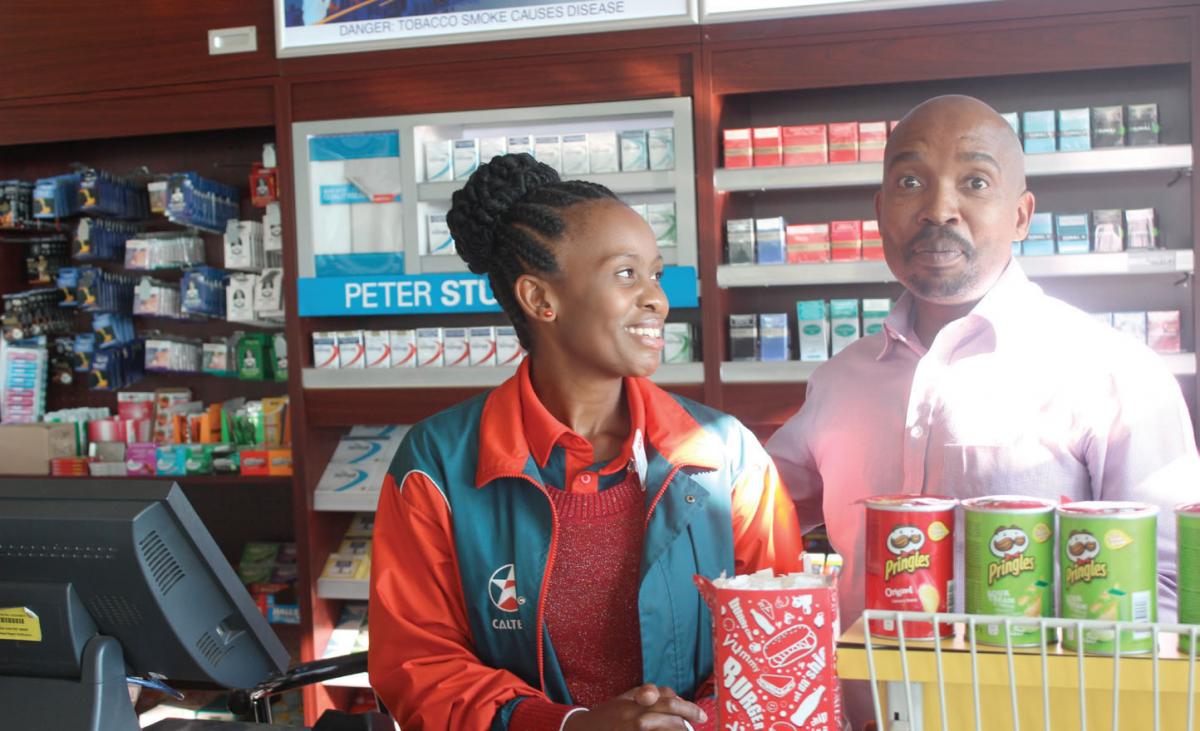 Phalatse, who holds a Bachelor of Commerce and an honours degree in Business Management from the University of Free State, worked at Standard Bank, for 13 years before he decided to become a full-time businessman.
Phalatse, who holds a Bachelor of Commerce and an honours degree in Business Management from the University of Free State, worked at Standard Bank, for 13 years before he decided to become a full-time businessman.
The former Free State Regional Manager of Business Banking at Standard Bank says he does not regret his decision to leave his plush job because he enjoys what he does.
“It fills me with joy to see the happy faces of people who work here. When some of them came for interviews you could see the desperation in their eyes. Now that they’ve got something and are able to put food on the table you can see the difference.”
Phalatse’s business was funded by the National Empowerment Fund (NEF) to the tune of R3.1 million. He bought a Caltex franchise and named it Tshela Filling Station.
The NEF is one of the agencies under the Department of Trade and Industry established to promote and facilitate black economic participation by providing financial and non-financial support to black empowered businesses.
It provides finance for rural and community development, conventional entrepreneurship, franchising, procurement funding, expansion capital and acquisition finance. One of the aspects that differentiates the NEF from other financers is its on-going support to recipients of NEF financial backing.
The NEF provides different types of funding for many various businesses. For everything from textiles, engineering, media, manufacturing, construction, transportation and agro-processing, the agency is there to lend a hand.
Phalane says his application was processed quickly because he had all the documents the NEF needed. “Our request to the NEF took a month from the day of application to approval.”
Since granting the loan, the NEF has been supportive of their business. “The relationship between the NEF and Phalane and his partner has been good and so far the business is doing well,” he said with a smile during a recent interview with Vuk’uzenzele.
Tshela Filling Station is situated on a busy road in Botshabelo, outside Bloemfontein, and employs 22 young people from the area, many of whom where unemployed when they joined the business.
Phalatse has not started repaying the NEF, but will soon start doing so in line with the contract signed with NEF.
The start and growth of any business does not come without challenges but Phalatse had overcome everything that has come his way. “One of the challenges I faced when I started was access to markets and a lack of experience in running a business of this nature.
One had to double their efforts to prove oneself, especially in the filling station business. He said he spent sleepless nights working hard to ensure that his business became successful.
“One of the other challenges was that the filling station was closed for almost six months before we took it over.” The old filling station used to run dry from time to time, and this created negative market perception of the business.
“We had to work very hard to restore the motorists’ confidence. Firstly we had to ensure that there is enough fuel at any given time [and] communicate with the motorists that the business is now under new ownership and management.”
It took a while before customers become enthusiastic about Tshela Filling Station. “This took us at least three months of vigorous communication and promise of excellent customer service and uninterrupted service.”
Phalatse said young entrepreneurs must have a passion for what they do and be prepared to work hard to make their business a success, because government is willing to assist young and up-and-coming black entrepreneurs.
For more information on how to apply, contact the NEF
Tel: 0861 843 633
Website: www.nefcorp.co.za
Special desks to help small businesses
Special desks to help small businesses JoyThe opening of the specialised small business support desks at the South African Revenue Service (SARS) branch in Orlando East will help small business taxpayers in the area.
“We are unveiling the SARS small business desks that will provide a dedicated service to small business entrepreneurs. This initiative is to support small business development flows from our government’s vision contained in the National Development Plan (NDP) to put our country on a new trajectory,” said Commissioner Tom Moyane.
The commissioner was speaking at the official opening of the revenue service’s Orlando East branch in Soweto recently. The branch has been in operation since 12 May 2014. The opening also coincided with the launch of the small business support desks at the branch.
Business tax advice, entity registration, business returns submissions and Tax Clearance Certificates (TCC) are among the services provided by the support desks.
“The small business desks, which are being rolled out at SARS branches around the country were established as part of government’s commitment to support SMMEs and to make it easier for them to comply with their tax obligations.”
Small businesses, said the commissioner, are the heartbeat of any developing economy because they create jobs.
“Today we are rolling back the high mortality rate of small business. The opening of this branch creates an avenue for all business entrepreneurs to have a desk at which they will be able to receive services.”
Since August 2014, the revenue service has established 138 small business desks in 50 out of the 52 SARS branches across the country. More desks are expected to be opened in the next two years due to demand.
“It is important that SARS creates avenues that to do business with SARS becomes easy,” said Moyane.
Representative of the Ministry of Small Business Development AM Mojalefa welcomed the establishment of the small business desks, saying the ministry was encouraged by the initiative.
Meanwhile, the commissioner urged taxpayers and business to continue paying their taxes and to do so in time.
He said there are many reasons for the low tax compliance in the small business segment. “The small business segment needs to be understood, they are survivalist in nature.”
Manager of the branch, Second Mohlala said the establishment of the desks demonstrates SARS’s commitment to bring services to the people.
Commissioner Moyane also unveiled a plaque at the opening of the Orlando East branch, which is the second branch to be opened in Soweto.
Bursaries: Bursary applications at Department of Water and Sanitation (2016)
Bursaries: Bursary applications at Department of Water and Sanitation (2016) JoyYoung South Africans who want to pursue careers that are in line with the Department of Water and Sanitation’s core business are urged to apply for its bursary scheme programme for the 2016 academic year.
The department provides bursaries annually, through its Learning Academy external bursary scheme, to stem the shortage of skills in the water and sanitation sector.
The external bursary scheme aims to attract exceptional young and innovative talent to the department.
The bursary covers the following fields of study: analytic chemistry, aquatic sciences, biochemistry, biological sciences, cartography, civil/electrical/mechanical engineering, environmental law/management/ science, geo-chemistry, geographical information systems, geo-hydrology, geology, hydrology, limnology, microbiology, surveying, water and sanitation, water care, water resource management, and water utilisation.
The learning academy, which is committed to the effective administration of the programme, is aimed at forestalling a skills shortage within the department that will arise from the retirement of senior engineering and technical management personnel.
Currently, the departmental bursaries for the full time pre- and post-graduate studies are granted on an annual basis to learners at these South African universities: University of Pretoria, University of KwaZulu-Natal, University of the Free State, University of Cape Town, University of Stellenbosch, University of the Western Cape, University of Limpopo, Nelson Mandela Metropolitan University, Walter Sisulu University, Tshwane University of Technology, Durban University of Technology, Central University of Technology, Cape Peninsula of University of Technology, Vaal University of Technology, University of Venda, University of Witwatersrand, University of Johannesburg and University of Zululand.
Bursaries will be allocated on the basis of a balanced consideration of academic performance, race and gender, financial need, need of the department in reference to the specific qualification, and an interview schedule.
Assistance will be provided on a year-to-year basis and bursaries will be renewed only if performance of bursars is satisfactory.
The department will require bursars who obtain their qualifications to join its Learning Academy on a fixed term contract for a maximum of five years but not less than three years.
The department’s bursary scheme boasts an all-inclusive package, which is highly competitive. Successful applicants will receive full tertiary registration and tuition costs, residence and meal fees, book allowance and an annual personal allowance.
Application forms can be found at www.dws.gov.za/LearningA. For enquiries contact Verena Meyer on 012 336 7448 or email meyerv@dwa.gov.za.
The closing date for 2016 bursary applications is 31 July 2015.
Bursaries 2016: Department of Agriculture, Forestry and Fisheries
Bursaries 2016: Department of Agriculture, Forestry and Fisheries Estelle GreeffThe Department of Agriculture, Forestry and Fisheries bursary awards for 2016

Fields of studies [Minimum requirements (National Senior Certificate)]
1. B.Sc. Bioresource Engineering (Agricultural Engineering) [Mathematics and Physical Science 6 (70-79)]
2. Bachelor of Veterinary Science (B.V.Sc.) [Mathematics and Physical Science 6 (70-79)]
3. B.Sc. Viticulture and Oenology [Mathematics and Physical Science 5 (60-69)]
4. B.Sc. Food Science [Mathematics and Physical Science 5 (60-69)]
5 B.Sc. Plant Pathology [Mathematics and Physical Science 5 (60-69)]
6. B.Sc. Agric. Soil Science [Mathematics and Physical Science 5 (60-69)]
7. B.Sc. Agric .Agronomy [Mathematics and Physical Science 5 (60-69)]
8. B.Sc. Genetics [Mathematics and Physical Science 5 (60-69)]
9. B.Sc. Forestry and Wood Science [Mathematics and Physical Science 5 (60-69)]
10. B.Sc. Geo-informatics [Mathematics and Physical Science 5 (60-69)]
11. B.Sc. Marine Biology [Mathematics and Physical Science 5 (60-69)]
12. B.Sc. Oceanography and Marine Biology [Mathematics and Physical Science 5 (60-69)]
13. B.Sc. Ichthyology specialising in Aquaculture [Mathematics and Physical Science 5 (60-69)]
14. National Diploma: Food Technology [Mathematics and Physical Science 4 (50-59)]
15. National Diploma: Forestry [Mathematics and Physical Science 4 (50-59)]
16. National Diploma: Fisheries Resource Management [Mathematics and Physical Science 4 (50-59)]
17. National Diploma: Marine Science [Mathematics and Physical Science 4 (50-59)]
18. Postgraduate studies (B.Tech, B.Sc. Hons, M.Tech., M.Sc., D.Tech. and Ph.D.) in different agriculture, forestry and fisheries study fields linked to DAFF priority research projects.
NOTES
1. It is worth noting that certain fields of study are only available at certain institutions of higher learning:
- B.Sc. Bioresource Engineering (Agricultural Engineering): University of KwaZulu-Natal
- Bachelor of Veterinary Science (B.V.Sc.): University of Pretoria
- B.Sc. Viticulture and Oenology: University of Stellenbosch
- B.Sc. Forestry and Wood Science: University of Stellenbosch
- B.Sc. Oceanography and Marine Biology: University of Cape Town
- B.Sc. Ichthyology specialising in Aquaculture: Rhodes University
- National Diploma: Forestry: Nelson Mandela Metropolitan University
- National Diploma: Marine Science : Cape Peninsula University of Technology
- National Diploma: Fisheries Resource Management: Cape Peninsula University of Technology
2. Applicants must be South African citizens.
3. Applicants must complete the relevant bursary application forms available from the website address: www.daff.gov.za (Click the following: Food Security and Agrarian Reform Branch then Sector Education and Training and then Careers).
4. Successful candidates will be informed from 20 January 2016 after the National Bursary Committee has finalised the selection process. If you do not hear from us by the end of January 2016, consider your application as unsuccessful.
5. All completed bursary application forms together with certified copies of ID and certificates/performance results should be sent to the following address:
The Director: Ms Amanda Shokane
Directorate: Sector Education and Training
Department of Agriculture, Forestry and Fisheries
Private Bag X250
Pretoria
For further enquiries please contact:
Ms Tshilidzi Netshilema: 012 319 7848
Mr Looksharp Makaringi: 012 319 7923
Ms Boitumelo Maleka: 012 319 7024
NB.
- The Department of Agriculture, Forestry and Fisheries reserves the right to determine the total number of bursary allocations for the academic year based on the total budget available.
- The National Bursary Committee will make use of the Bursary Scheme’s 14-point system to allocate points to shortlisted applicants.
- The Bursary Scheme of the Department of Agriculture, Forestry and Fisheries is in fulfilment of the sector strategic objective of elimination of skewed participation in the agriculture, forestry and fisheries sectors.
Closing date for all applications is 30 September 2015
The Department of Agriculture, Forestry and Fisheries intends to award comprehensive bursaries to qualifying applicants pursuing and/or intending to further their studies in critical scarce skills in agriculture, forestry and fisheries sectors for the 2016 academic year. The bursary will cover tuition, accommodation, books, meals and monthly allowance. The bursary awards target the previously disadvantaged and impoverished persons from poverty-stricken and rural communities. People with disabilities are also encouraged to apply
Jobs: Department of Social Development
Jobs: Department of Social Development Estelle GreeffDIRECTOR: PUBLIC LIAISON AND EVENTS MANAGEMENT (Ref: 2015/22)
Chief Directorate: Communication
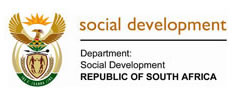 TOTAL PACKAGE: R 819 126 per annum
TOTAL PACKAGE: R 819 126 per annum
Center: HSRC Building, Pretoria
This inclusive remuneration package consists of a basic salary, the states’ contribution to the Government Employees Pension Fund and a flexible portion that may be structured i.t.o. the applicable rules
REQUIREMENTS:
An appropriate recognised Bachelors Degree in Communication/ Marketing/ Public Relations or equivalent qualification (NQF level 7) PLUS five years middle/senior management experience in the Public Liaison and Events Management field. Knowledge of the relevant Public Service legislation. Knowledge of national and international social political developments. Knowledge and understanding of formal and non-formal communication approaches. Knowledge of Events Management.
Competencies needed: Public Relations. Networking (Internal and External). Analytical and Research. Strategic Planning. Negotiation. Programme and project management. Financial management. Policy analysis and development. Communication (verbal and written). Service delivery innovation. Problem-solving and change management. People Management and empowerment. Client orientation and customer focus. Stakeholder management. Presentation and facilitation.
Attributes: Willingness to travel. Ability to work under pressure. Innovative and creative. Ability to work in a team and independently. Independent thinker. Honesty and Integrity.
KEY RESPONSIBILITIES:
Develop, implement and monitor external communication and marketing strategies to promote the Department’s programmes with regard to public liaison. Manage and plan the Ministerial provincial visits, public participation, Imbizos and campaigns in collaboration with line function. Establish and maintain public liaison, stakeholder relations and partnership with regard to development communication. Co-ordinate the international reports of the Chief Directorate: Communication. Manage an effective communication interface with GCIS as well as the communication units of national, provincial and local government departments with regard to public liaison. Keep abreast with political and social trends.
ENQUIRIES: Ms L Oliphant Tel: (012) 312-7653
APPLICATIONS TO BE FORWARDED, QUOTING THE RELEVENT REFERENCE NUMBER TO:
The Director General, Department of Social Development, Private Bag X901, Pretoria, 0001. Physical Address: HSRC Building, 134 Pretorius Street, Pretoria.
FOR ATTENTION: Ms E de Waal
CLOSING DATE: 03 July 2015
NOTE A curriculum vitae with a detailed description of duties, the names of two referees, certified copies of qualifications and identity document must accompany your signed application for employment (Z83). Shortlisted candidates for SMS posts will be required to undergo competence assessment. The successful candidate will sign an annual performance agreement, complete a financial disclosure form and also be required to undergo a security clearance. If the candidate is applying for an OSD post, certificates of service must be attached to the CV. No faxed or e-mailed applications will be considered. It is the applicant’s responsibility to have foreign qualifications evaluated by the South African Qualification Authority (SAQA). Failure to submit the requested documents will result in your application not being considered. Personnel suitability checks will be conducted on short listed candidates and the appointment is subject to positive outcomes of the checks. Correspondence will be limited to shortlisted candidates only. If you have not been contacted within three months after the closing date of this advertisement, please accept that your application was unsuccessful. “The Department of Social Development supports persons with disabilities”
It is our intention to promote representivity (race, gender and disability) in the Public Service through the filling of this post and candidates whose transfer / promotion/ appointment will promote representivity will receive preference.
SA, neighbours agree on digital migration
SA, neighbours agree on digital migration Estelle GreeffInternational relations
South Africa and Mozambique have signed an agreement that will be mutually beneficial to the two neighbouring countries.
 The agreement, which was signed recently, aims to minimise potential radio frequency interference as a result of migrating from an analogue to a digital broadcasting system.
The agreement, which was signed recently, aims to minimise potential radio frequency interference as a result of migrating from an analogue to a digital broadcasting system.
Communications Minister Faith Muthambi, who signed the agreement with her counterpart, Transport and Communications Minister Carlos Fortes Mesquite, said the agreement would benefit citizens from both countries.
“All of us should be proud about this bilateral agreement in that it is for the benefits of all our people. We’ve discussed issues pertaining to the potential frequency spectrum interference as a result of the digital migration programme implementation and of course the main objective was to identify issues of mutual interest on cross border interference in order to establish an amicable solution of addressing challenges as and when they arise,” she said.
Speaking after signing the agreement, Minister Fortes Mesquite said: “As a country, we have been ready for digital migration, but however, because we want to move together with the Southern African Development Community region, we had to wait for some of our neighbouring countries to get ready for this digital migration process in order to avoid potential radio frequency interference.
“We are very grateful to have signed this agreement with South Africa as we believe that this will benefit us in terms of sharing of technical knowledge. We are doing all these because we know that digital migration will bring more opportunities for our people,” he said.
South Africa is in the process of signing and concluding agreements with the Southern African neighbours who were not able to meet Telecommunication Union’s (ITU) 17 June 2015 digital migration process deadline. Countries who missed the deadline are no longer protected against signal interference.
Mozambique is the fourth country to sign the agreement of cooperation in mitigating cross border radio frequency spectrum interference with South Africa. Neighbouring countries that have already signed the agreement are Botswana, Lesotho, Swaziland and Namibia.
South Africa’s Head of Digital Migration Programme, Solly Mokoetle, said their discussions also focused on sharing of migration plans, processes to handle frequency spectrum interference and the release of digital dividend’s timing.
He said South Africa’s national digital network coverage comprises Digital Terrestrial Television (DTT) transmission coverage of 84 per cent of the population with the remaining 16 per cent to be covered by satellite network.
“The process of rolling out of Set-Top Boxes (STB) is aimed at a period of between 18-24 months once the Minister announces the performance period after consulting the Cabinet based on the potential timelines of the availability of (STBs).”
Director-General for the Mozambique Communication Regulator, Professor Americo Muchanga, speaking through a translator, said their country’s analogue transmission covers 70 per cent of the population, adding that the DTT rollout will commence in the coming weeks with the intention to complete major cities (10) and borderline areas (8) by December this year.
“Different STB distribution plans are being considered awaiting Cabinet decision and dual-illumination will continue for a minimum of two years,” he said.
After signing the agreement with Namibia. While in Namibia, Minister Muthambi attended the Southern Africa Development Community (SADC) Communications, Information Communications Technology (ICT) and Postal Ministers' meeting. The Minister will sign with Zimbabwe soon.
Digital Terrestrial Television (DTT)
DTT is a reliable and much cost efficient means to distribute linear television content and has many advantages over the old analogue broadcasting that is still in use today. One of its major advantages for communities is that it clears the analogue spectrum for the delivery of broadband mobile internet and Wi-fi services.
Digital migration refers to the switch from an analogue broadcasting system to a digital broadcasting system and this has been a worldwide move, which is being driven by the ITU since the signing of the GE06 multilateral agreement in Geneva in 2006.
In order to view digital television signals on an ordinary analogue television set, consumers will need a STB. The purpose of the STB is to convert the DTT signal for reception on an ordinary analogue television set.
If consumers haven’t acquired a STB by analogue switch-off date, they will no longer be able to view the existing terrestrial television broadcasting services
The Department of Communication anticipates the rollout of STBs to be completed in the coming 18-24 months so that South Africans can switch off analogue signal.
SA makes a mark on global stage
SA makes a mark on global stage Estelle GreeffInternational relations
The interests of the African continent plays a key role in South Africa’s foreign policy, said International Relations and Cooperation Minister Maite Nkoana-Mashabane.
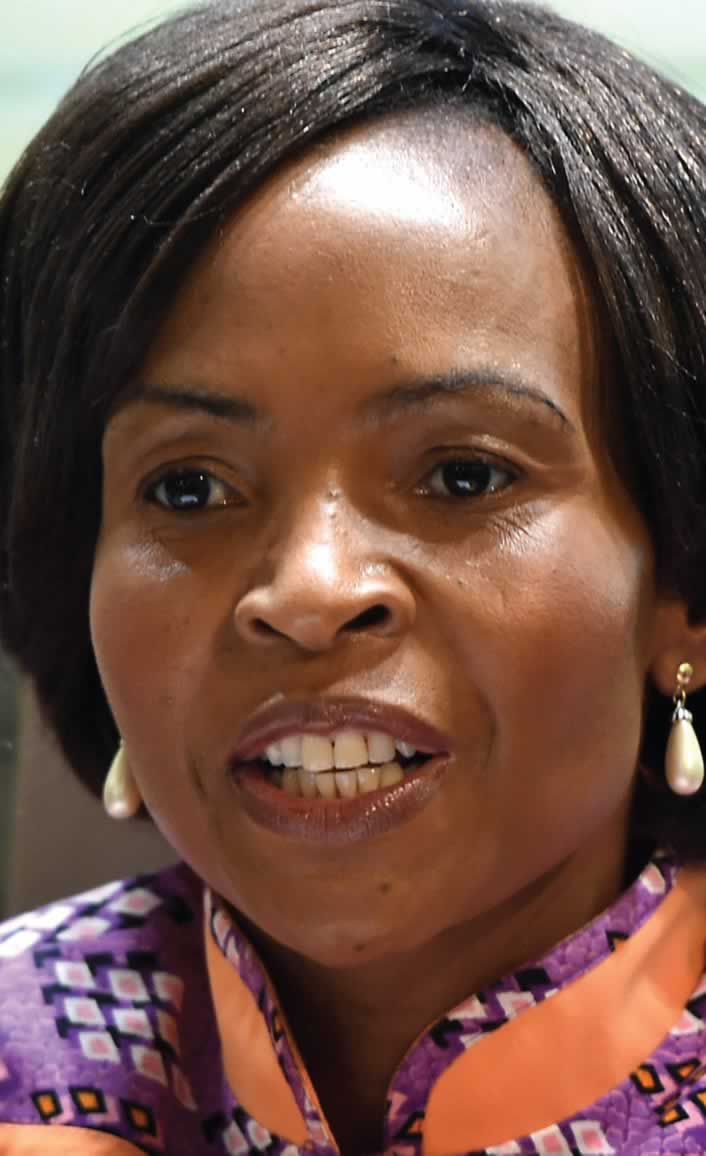 The Minister made these comments when she recently tabled her department’s Budget Vote in Parliament recently.
The Minister made these comments when she recently tabled her department’s Budget Vote in Parliament recently.
“The African continent remains central in our foreign policy, and this approach forms the basis for our friendship, cooperation and peace efforts all over the world. We stand for cooperation and partnership, instead of competition, in global affairs.
“Our country’s entry into its third decade of freedom coincides with the emergence of distinct global trends which demand that we creatively navigate and find opportunities, working together with our people at home and friends and partners abroad,” she said.
The Minister added that trade with other African states was at the top of government’s agenda.
Since 1994, trade with Africa has increased 35-fold to about R400 billion.
Minister Nkoana-Mashabane said over the next three years, South Africa’s priority would be:
- Consolidating political, economic and social relations with the countries of the world.
- Participating in the global governance institutions.
- Enhancing operational capacity by strengthening policy and coordination in relation to ongoing South African development cooperation.
- The implementation of the African Union’s Agenda 2063, which is a call for action and a roadmap to achieve the continent’s development goals to see Africa being economically integrated with a bid of stamping out poverty as well as creating jobs and stability.
- Review of the current legislative framework governing the department’s operations abroad.
- Embarking on various infrastructure projects, and implementing the property management strategy.
“Our foreign policy is continuing its upward march, adapting and innovating, from frontier to frontier, beginning in our SADC neighbourhood, across the entire Africa for the implementation of the African Agenda, into the South to strengthen our co-operation there, to the North where our partners value a relationship with us, and in multilateral organizations where South Africa’s independent voice continue to be heard and respected,” said the Minister.
She described Africa as a growing giant, which South Africa is an important part of.
Peace and stability
The Minister said while “Africa is a giant on the rise”, it will remain underdeveloped if its core challenges of governance, sustainable development and peace and security, are not overcome.
“As Chair of the SADC Organ on Politics, Defence and Security Cooperation, South Africa is leading peace building and security efforts in the region. In this regard, we led no less than six SADC Electoral Observation Missions which were peaceful and credible,” she said.
“The realisation of the Africa we want requires peace, be it in the SADC, Great Lakes, the Horn, or in North Africa.
“Peace shall remain a dream if the continent continues to experience setbacks such as the recent coup attempt in Burundi. We reiterate our strongest condemnation of unconstitutional change of government and reaffirm our support for regional initiatives towards the restoration of political normalcy in Burundi.”
The Minister said to deal with these, a rapid response team for crises situations had to be operationalised as one of the tools for solutions to African problems.
“We must silence the guns! Africa must be at peace with itself!
“We will have the opportunity to contribute more in this regard when we chair the AU’s Peace and Security Council later this year,” she added.
Economic, political, international ties
The Minister said while Africa is a key area of focus, South Africa must sustain its bilateral relations with the countries of the South and North and in multilateral organisations.
While South Africa remains committed to the BRICS (Brazil, Russia, India, China and South Africa) partnership the Minister said government’s strategy was to pursue wider access to fast growing Asian markets.
“This strategy will allow us to secure more beneficiated exports to that region and vigorously seek increased Foreign Direct Investment and tourism opportunities.
Other regions that South Africa will continue to strengthen economic and political relations with include Latin America and the Caribbean, Europe, USA and Canada, among others.
SA school rugby team shine in Monaco
SA school rugby team shine in Monaco Estelle GreeffSport, arts and culture
Orchards Primary School’s U12 rugby team got a once-in-a-lifetime opportunity when it was chosen to represent South Africa at a rugby tournament in Monaco, Western Europe, recently.
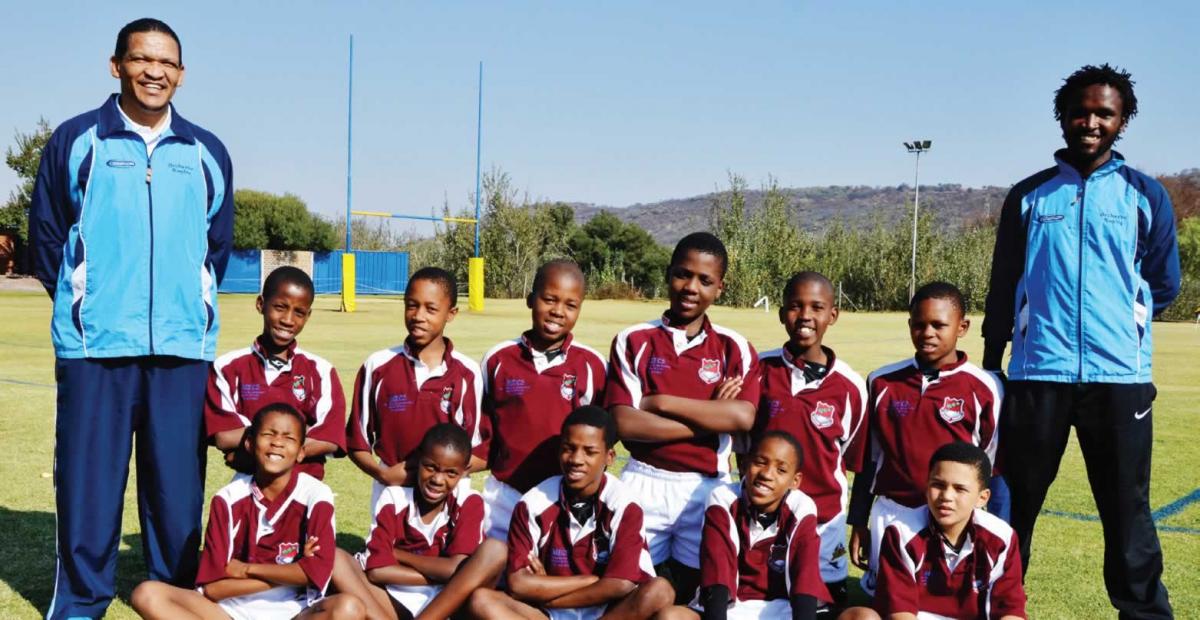 The team took part in the 5th edition of the "Saint Devote Rugby Tournament", organised by the Monaco Rugby Federation, in partnership with the Princess Charlene of Monaco Foundation.
The team took part in the 5th edition of the "Saint Devote Rugby Tournament", organised by the Monaco Rugby Federation, in partnership with the Princess Charlene of Monaco Foundation.
The aim of the tournament is to develop the values of rugby beyond the sporting aspect.
The South African Rugby Legends Association (SARLA) organised the trip for the team.
Leon van Vuuren, the principal of the Johannesburg school, said that he was happy with the opportunity presented to the boys.
“It was a privilege, a once-in-a-lifetime opportunity. It was also during the school holidays so it didn’t clash much with their schooling and class times.
“We grabbed the opportunity with both hands and didn’t think twice about it,” said Van Vuuren.
Before leaving for Monaco the team visited President Jacob Zuma in Pretoria, who wished the boys well.
Team coach Selwyn January said the trip to Monaco was an experience of a lifetime.
The team agrees that one of the highlights was meeting Princess Charlene, a former South African Olympic swimmer, who is married to Prince Albert of Monaco.
“We met Princess Charlene and President of SARLA Gavin Varejes and went go-karting and zip-lining. We enjoyed our tournament,” said team member Kelvin Alvin.
Recalling the first time the boys met Princess Charlene, January said the boys could not contain their excitement.
A better Africa, a better future
A better Africa, a better future Estelle GreeffSport, arts and culture
Government has called on all schools, churches, community choirs and individuals to learn and practice the African Union (AU) anthem.
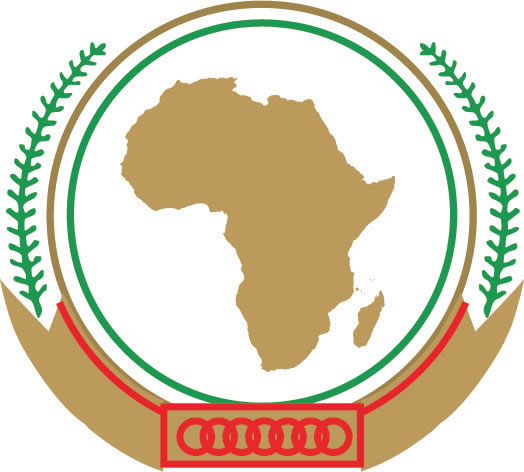 “We urge South African institutions and companies to begin flying the AU flag together with the South African flag,” said President Jacob Zuma.
“We urge South African institutions and companies to begin flying the AU flag together with the South African flag,” said President Jacob Zuma.
He said this forms part of celebrating and reclaiming the African identity of our country and people.
President Zuma was speaking at the Africa Day celebrations in Pretoria recently.
The AU is a union consisting of 54 countries in Africa. The only African state that is not a member is Morocco. The AU was established on 26 May 2001 in Addis Ababa and launched on 9 July 2002 in South Africa, with the aim of replacing the Organisation of African Unity (OAU).
One of the main objectives of the AU is to promote unity and solidarity among Africans.
The President encouraged South Africans to learn more about the AU and the continent.
“As South Africans we are proud of our African identity. We are proud to be part of a continent that is growing, that has a bright future.”
Here are the words of the anthem:
AU Anthem:
Let us all unite and celebrate together
The victories won for our liberation
Let us dedicate ourselves to rise together
To defend our liberty and unity
O Sons and Daughters of Africa
Flesh of the Sun and Flesh of the Sky
Let us make Africa the Tree of Life
Let us all unite and sing together
To uphold the bonds that frame our destiny
Let us dedicate ourselves to fight together
For lasting peace and justice on earth
O Sons and Daughters of Africa
Flesh of the Sun and Flesh of the Sky
Let us make Africa the Tree of Life
Let us all unite and toil together
To give the best we have to Africa
The cradle of mankind and fount of culture
Our pride and hope at break of dawn
O Sons and Daughters of Africa Flesh of the Sun and Flesh of the Sky
Let us make Africa the Tree of Life.
AB de Villiers makes a clean sweep at cricket awards
AB de Villiers makes a clean sweep at cricket awards Estelle GreeffSport, arts and culture
Batting sensation AB de Villiers is one of the best batsmen in the world - a fact that did not go unnoticed at the recent Cricket South Africa (CSA) Awards
![Deputy Minister of Sport and Recreation Gert Oosthuizen, AB de Villiers and Cricket South Africa President Chris Nenzani at the 2015 Cricket South Africa Awards. [Photo/Gallo Images] Deputy Minister of Sport and Recreation Gert Oosthuizen, AB de Villiers and Cricket South Africa President Chris Nenzani at the 2015 Cricket South Africa Awards. [Photo/Gallo Images]](/sites/default/files/images2015-07/p16-ab.jpg) De Villiers' record-breaking performance in the 2014 cricketing year saw him scoop most of the awards on offer.
De Villiers' record-breaking performance in the 2014 cricketing year saw him scoop most of the awards on offer.
He won five awards and in the process matched Makhaya Ntini’s performance of 2005 and 2006 when he was named South Africa’s Cricketer of the Year for the second successive year.
Others who won the coveted award twice include Jacques Kallis (2004 and 2011) and Hashim Amla (2010 and 2013). Shaun Pollock (2007), Dale Steyn (2008), Graeme Smith (2009), and Vernon Philander (2012) were also previously named South Africa’s Cricketer of the Year
De Villiers also emulated Amla who won five awards in 2010.
De Villiers was also named Castle Lager ODI Cricketer of the Year while his peers and his fans honoured him by voting for him as SA Players’ Player of the Year and SA Fans’ Player of the Year respectively.
He also received the KFC So Good Award for scoring the fastest century in the history of ODI Cricket against the West Indies in December 2014.
CSA Chief Executive Haroon Lorgat said he believes De Villiers is among the best batsmen in the world currently.
“This has been another great year with truly wonderful achievements from our top players.
“AB is just so special and surely he must be the best all-round cricketer in the world. His performances are sheer class and his No. 2 ranking in Test match cricket and No. 1 in ODI cricket only tells a part of his amazing skills.”
Currently, De Villiers holds the records for the fastest 50, 100 and 150 in the world. “AB de Villiers has modestly taken limited overs batting to a new level and he has done it with style and panache that is simply beyond the reach of most. He is a true batting genius,” added Lorgat.
The other major awards went to Amla as Test Cricketer of the Year and Morne van Wyk as Ticketpro T20 Cricketer of the Year. Steyn won the RAM Delivery of the Year and Rilee Rossouw was named SA Newcomer of the Year while Shabnim Ismail was named Momentum Women’s Cricketer of the Year.
The Khaya Majola Lifetime Achievement Award went to Shepherd Ngcaba for his services to the game over nearly half a century. He has been the driving force behind the success of the Good Hope Cricket Club in King Williams Town and has played a major role in the development of facilities in the surrounding rural areas.
He has also served on the executive of the Border Cricket Board.
